Negotiation Skills: Types of Crises and Crisis Management
VerifiedAdded on 2023/03/30
|23
|4688
|209
AI Summary
This article discusses the importance of negotiation skills in managing different types of crises in organizations. It covers the types of crises in management, crisis management strategies, and the impact of social media on crisis management.
Contribute Materials
Your contribution can guide someone’s learning journey. Share your
documents today.
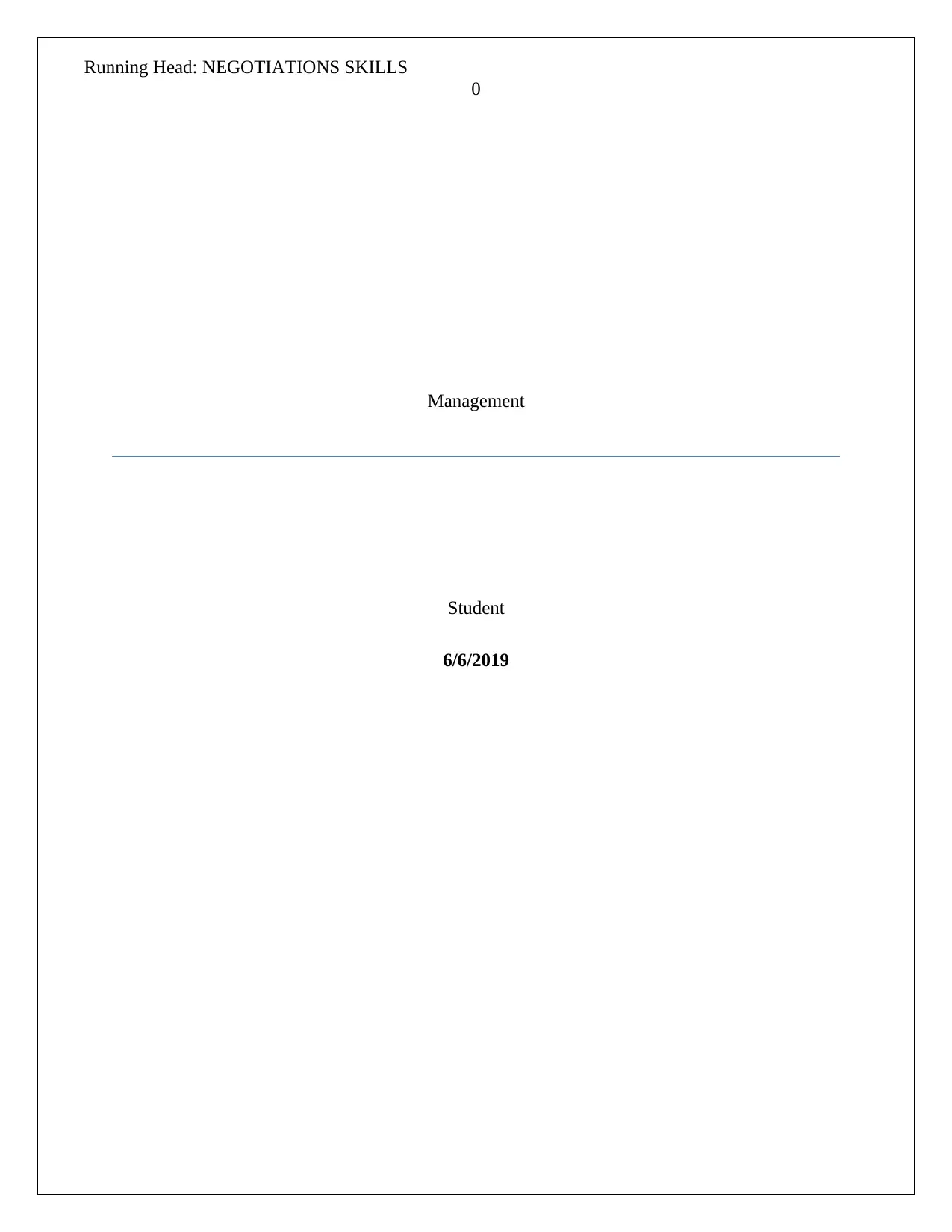
Running Head: NEGOTIATIONS SKILLS
0
Management
Student
6/6/2019
0
Management
Student
6/6/2019
Secure Best Marks with AI Grader
Need help grading? Try our AI Grader for instant feedback on your assignments.
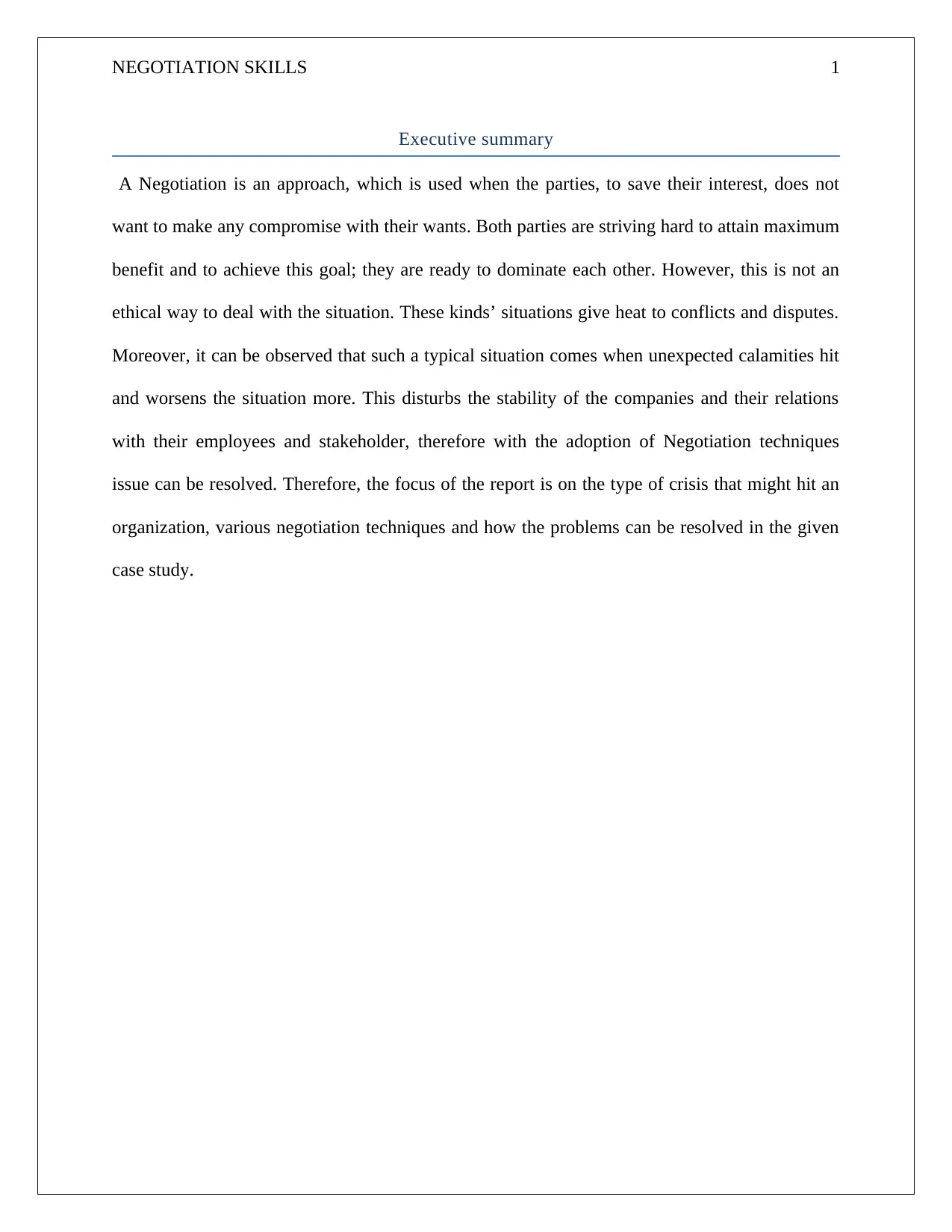
NEGOTIATION SKILLS 1
Executive summary
A Negotiation is an approach, which is used when the parties, to save their interest, does not
want to make any compromise with their wants. Both parties are striving hard to attain maximum
benefit and to achieve this goal; they are ready to dominate each other. However, this is not an
ethical way to deal with the situation. These kinds’ situations give heat to conflicts and disputes.
Moreover, it can be observed that such a typical situation comes when unexpected calamities hit
and worsens the situation more. This disturbs the stability of the companies and their relations
with their employees and stakeholder, therefore with the adoption of Negotiation techniques
issue can be resolved. Therefore, the focus of the report is on the type of crisis that might hit an
organization, various negotiation techniques and how the problems can be resolved in the given
case study.
Executive summary
A Negotiation is an approach, which is used when the parties, to save their interest, does not
want to make any compromise with their wants. Both parties are striving hard to attain maximum
benefit and to achieve this goal; they are ready to dominate each other. However, this is not an
ethical way to deal with the situation. These kinds’ situations give heat to conflicts and disputes.
Moreover, it can be observed that such a typical situation comes when unexpected calamities hit
and worsens the situation more. This disturbs the stability of the companies and their relations
with their employees and stakeholder, therefore with the adoption of Negotiation techniques
issue can be resolved. Therefore, the focus of the report is on the type of crisis that might hit an
organization, various negotiation techniques and how the problems can be resolved in the given
case study.
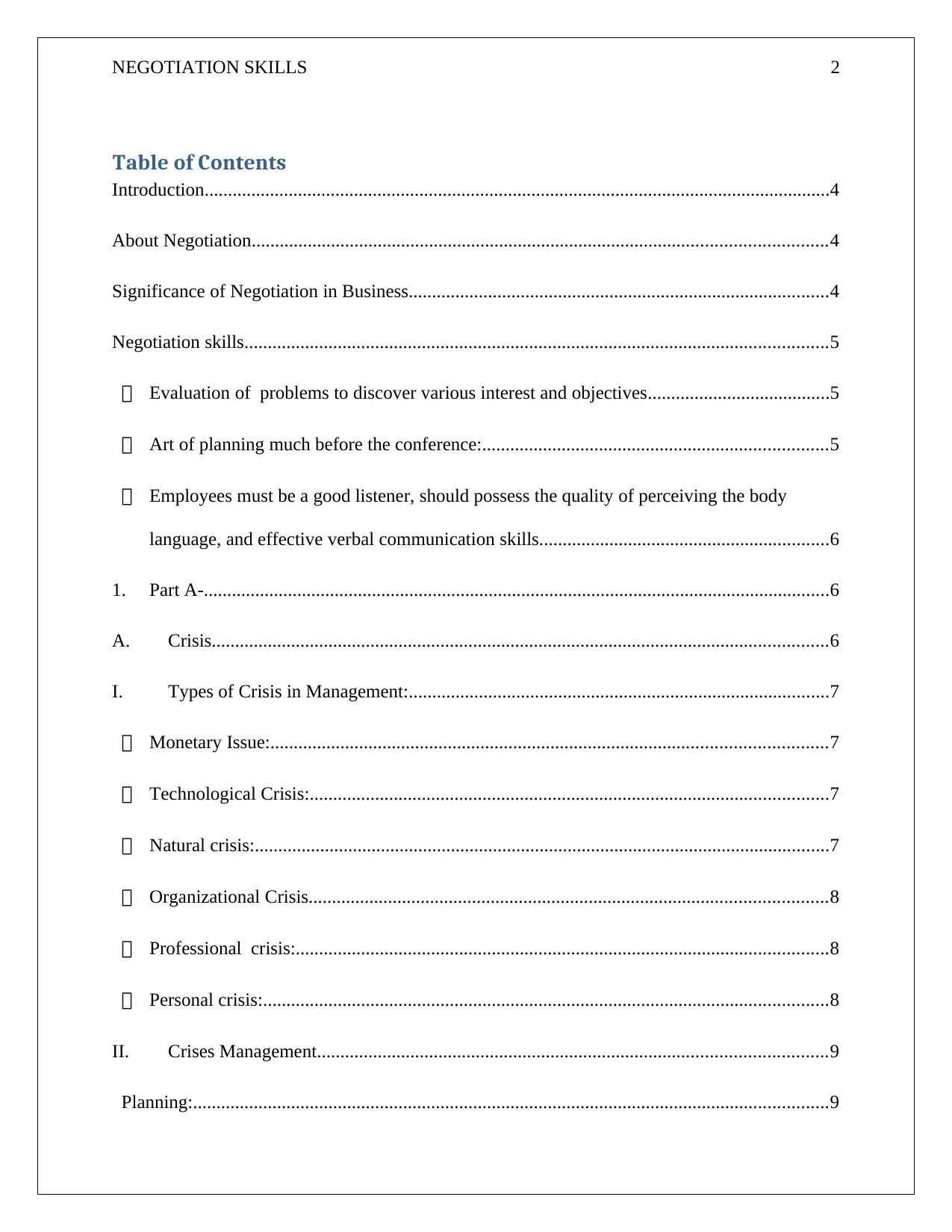
NEGOTIATION SKILLS 2
Table of Contents
Introduction......................................................................................................................................4
About Negotiation...........................................................................................................................4
Significance of Negotiation in Business..........................................................................................4
Negotiation skills.............................................................................................................................5
Evaluation of problems to discover various interest and objectives.......................................5
Art of planning much before the conference:..........................................................................5
Employees must be a good listener, should possess the quality of perceiving the body
language, and effective verbal communication skills..............................................................6
1. Part A-......................................................................................................................................6
A. Crisis....................................................................................................................................6
I. Types of Crisis in Management:..........................................................................................7
Monetary Issue:.......................................................................................................................7
Technological Crisis:...............................................................................................................7
Natural crisis:...........................................................................................................................7
Organizational Crisis...............................................................................................................8
Professional crisis:..................................................................................................................8
Personal crisis:.........................................................................................................................8
II. Crises Management.............................................................................................................9
Planning:........................................................................................................................................9
Table of Contents
Introduction......................................................................................................................................4
About Negotiation...........................................................................................................................4
Significance of Negotiation in Business..........................................................................................4
Negotiation skills.............................................................................................................................5
Evaluation of problems to discover various interest and objectives.......................................5
Art of planning much before the conference:..........................................................................5
Employees must be a good listener, should possess the quality of perceiving the body
language, and effective verbal communication skills..............................................................6
1. Part A-......................................................................................................................................6
A. Crisis....................................................................................................................................6
I. Types of Crisis in Management:..........................................................................................7
Monetary Issue:.......................................................................................................................7
Technological Crisis:...............................................................................................................7
Natural crisis:...........................................................................................................................7
Organizational Crisis...............................................................................................................8
Professional crisis:..................................................................................................................8
Personal crisis:.........................................................................................................................8
II. Crises Management.............................................................................................................9
Planning:........................................................................................................................................9
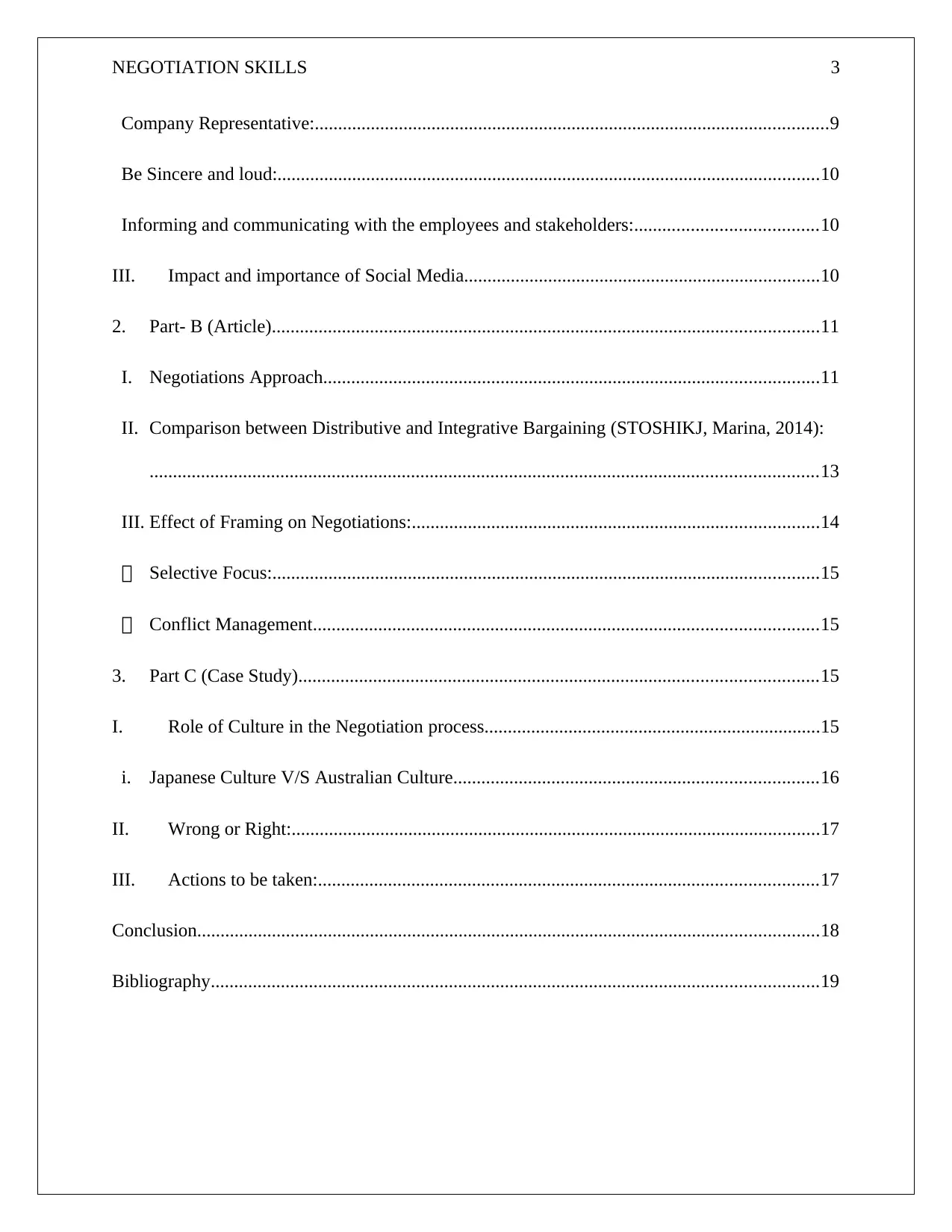
NEGOTIATION SKILLS 3
Company Representative:..............................................................................................................9
Be Sincere and loud:....................................................................................................................10
Informing and communicating with the employees and stakeholders:.......................................10
III. Impact and importance of Social Media............................................................................10
2. Part- B (Article).....................................................................................................................11
I. Negotiations Approach..........................................................................................................11
II. Comparison between Distributive and Integrative Bargaining (STOSHIKJ, Marina, 2014):
...............................................................................................................................................13
III. Effect of Framing on Negotiations:.......................................................................................14
Selective Focus:.....................................................................................................................15
Conflict Management............................................................................................................15
3. Part C (Case Study)...............................................................................................................15
I. Role of Culture in the Negotiation process........................................................................15
i. Japanese Culture V/S Australian Culture..............................................................................16
II. Wrong or Right:.................................................................................................................17
III. Actions to be taken:...........................................................................................................17
Conclusion.....................................................................................................................................18
Bibliography..................................................................................................................................19
Company Representative:..............................................................................................................9
Be Sincere and loud:....................................................................................................................10
Informing and communicating with the employees and stakeholders:.......................................10
III. Impact and importance of Social Media............................................................................10
2. Part- B (Article).....................................................................................................................11
I. Negotiations Approach..........................................................................................................11
II. Comparison between Distributive and Integrative Bargaining (STOSHIKJ, Marina, 2014):
...............................................................................................................................................13
III. Effect of Framing on Negotiations:.......................................................................................14
Selective Focus:.....................................................................................................................15
Conflict Management............................................................................................................15
3. Part C (Case Study)...............................................................................................................15
I. Role of Culture in the Negotiation process........................................................................15
i. Japanese Culture V/S Australian Culture..............................................................................16
II. Wrong or Right:.................................................................................................................17
III. Actions to be taken:...........................................................................................................17
Conclusion.....................................................................................................................................18
Bibliography..................................................................................................................................19
Secure Best Marks with AI Grader
Need help grading? Try our AI Grader for instant feedback on your assignments.
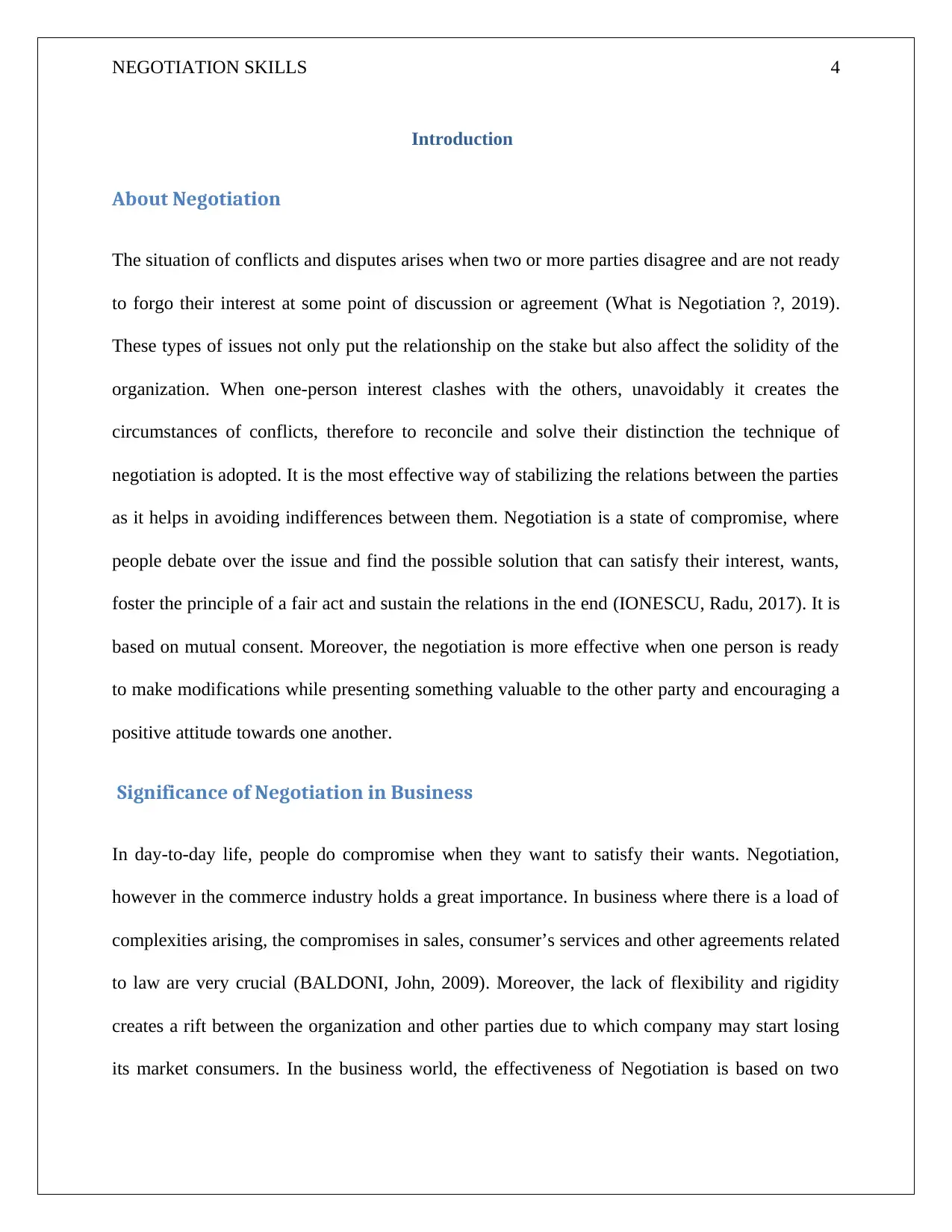
NEGOTIATION SKILLS 4
Introduction
About Negotiation
The situation of conflicts and disputes arises when two or more parties disagree and are not ready
to forgo their interest at some point of discussion or agreement (What is Negotiation ?, 2019).
These types of issues not only put the relationship on the stake but also affect the solidity of the
organization. When one-person interest clashes with the others, unavoidably it creates the
circumstances of conflicts, therefore to reconcile and solve their distinction the technique of
negotiation is adopted. It is the most effective way of stabilizing the relations between the parties
as it helps in avoiding indifferences between them. Negotiation is a state of compromise, where
people debate over the issue and find the possible solution that can satisfy their interest, wants,
foster the principle of a fair act and sustain the relations in the end (IONESCU, Radu, 2017). It is
based on mutual consent. Moreover, the negotiation is more effective when one person is ready
to make modifications while presenting something valuable to the other party and encouraging a
positive attitude towards one another.
Significance of Negotiation in Business
In day-to-day life, people do compromise when they want to satisfy their wants. Negotiation,
however in the commerce industry holds a great importance. In business where there is a load of
complexities arising, the compromises in sales, consumer’s services and other agreements related
to law are very crucial (BALDONI, John, 2009). Moreover, the lack of flexibility and rigidity
creates a rift between the organization and other parties due to which company may start losing
its market consumers. In the business world, the effectiveness of Negotiation is based on two
Introduction
About Negotiation
The situation of conflicts and disputes arises when two or more parties disagree and are not ready
to forgo their interest at some point of discussion or agreement (What is Negotiation ?, 2019).
These types of issues not only put the relationship on the stake but also affect the solidity of the
organization. When one-person interest clashes with the others, unavoidably it creates the
circumstances of conflicts, therefore to reconcile and solve their distinction the technique of
negotiation is adopted. It is the most effective way of stabilizing the relations between the parties
as it helps in avoiding indifferences between them. Negotiation is a state of compromise, where
people debate over the issue and find the possible solution that can satisfy their interest, wants,
foster the principle of a fair act and sustain the relations in the end (IONESCU, Radu, 2017). It is
based on mutual consent. Moreover, the negotiation is more effective when one person is ready
to make modifications while presenting something valuable to the other party and encouraging a
positive attitude towards one another.
Significance of Negotiation in Business
In day-to-day life, people do compromise when they want to satisfy their wants. Negotiation,
however in the commerce industry holds a great importance. In business where there is a load of
complexities arising, the compromises in sales, consumer’s services and other agreements related
to law are very crucial (BALDONI, John, 2009). Moreover, the lack of flexibility and rigidity
creates a rift between the organization and other parties due to which company may start losing
its market consumers. In the business world, the effectiveness of Negotiation is based on two
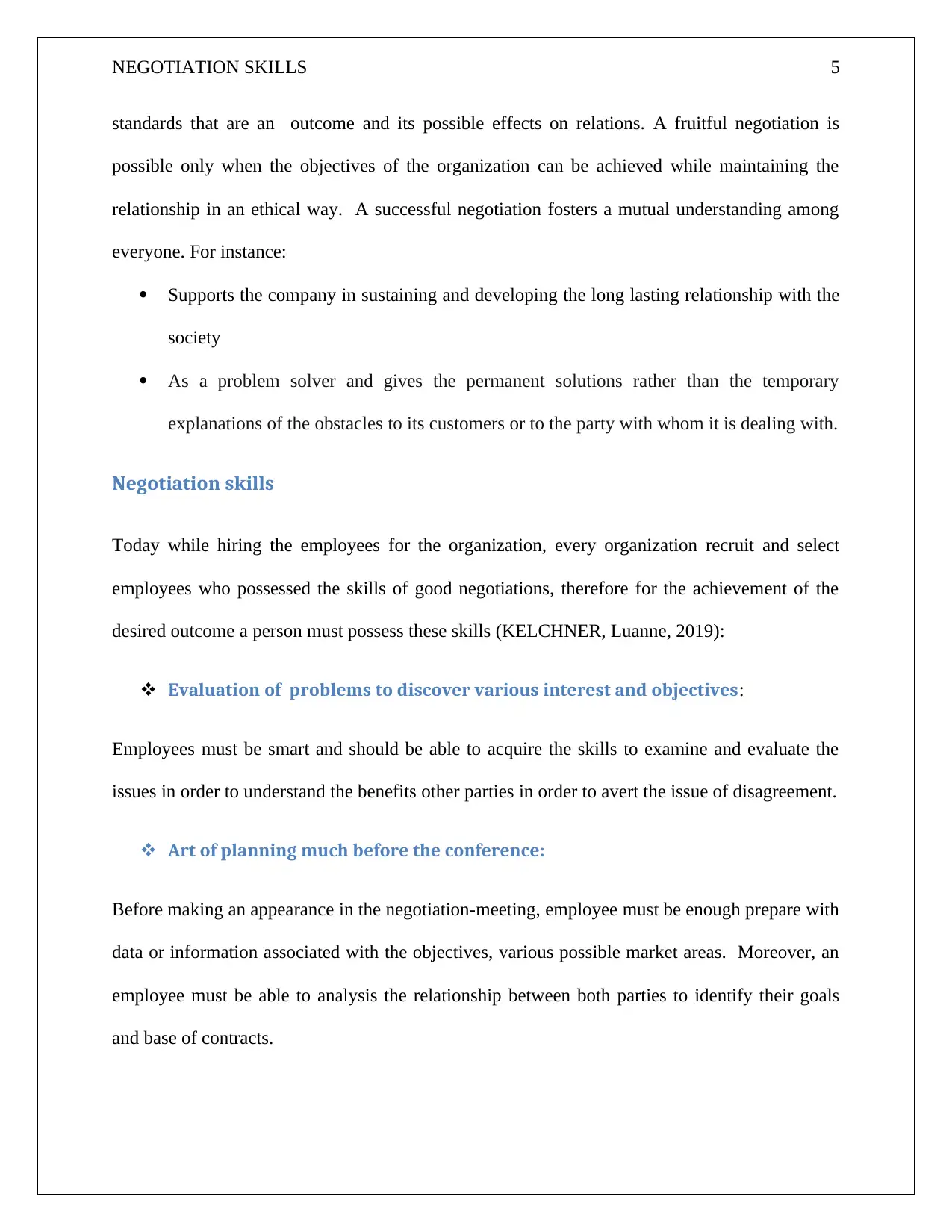
NEGOTIATION SKILLS 5
standards that are an outcome and its possible effects on relations. A fruitful negotiation is
possible only when the objectives of the organization can be achieved while maintaining the
relationship in an ethical way. A successful negotiation fosters a mutual understanding among
everyone. For instance:
Supports the company in sustaining and developing the long lasting relationship with the
society
As a problem solver and gives the permanent solutions rather than the temporary
explanations of the obstacles to its customers or to the party with whom it is dealing with.
Negotiation skills
Today while hiring the employees for the organization, every organization recruit and select
employees who possessed the skills of good negotiations, therefore for the achievement of the
desired outcome a person must possess these skills (KELCHNER, Luanne, 2019):
Evaluation of problems to discover various interest and objectives:
Employees must be smart and should be able to acquire the skills to examine and evaluate the
issues in order to understand the benefits other parties in order to avert the issue of disagreement.
Art of planning much before the conference:
Before making an appearance in the negotiation-meeting, employee must be enough prepare with
data or information associated with the objectives, various possible market areas. Moreover, an
employee must be able to analysis the relationship between both parties to identify their goals
and base of contracts.
standards that are an outcome and its possible effects on relations. A fruitful negotiation is
possible only when the objectives of the organization can be achieved while maintaining the
relationship in an ethical way. A successful negotiation fosters a mutual understanding among
everyone. For instance:
Supports the company in sustaining and developing the long lasting relationship with the
society
As a problem solver and gives the permanent solutions rather than the temporary
explanations of the obstacles to its customers or to the party with whom it is dealing with.
Negotiation skills
Today while hiring the employees for the organization, every organization recruit and select
employees who possessed the skills of good negotiations, therefore for the achievement of the
desired outcome a person must possess these skills (KELCHNER, Luanne, 2019):
Evaluation of problems to discover various interest and objectives:
Employees must be smart and should be able to acquire the skills to examine and evaluate the
issues in order to understand the benefits other parties in order to avert the issue of disagreement.
Art of planning much before the conference:
Before making an appearance in the negotiation-meeting, employee must be enough prepare with
data or information associated with the objectives, various possible market areas. Moreover, an
employee must be able to analysis the relationship between both parties to identify their goals
and base of contracts.
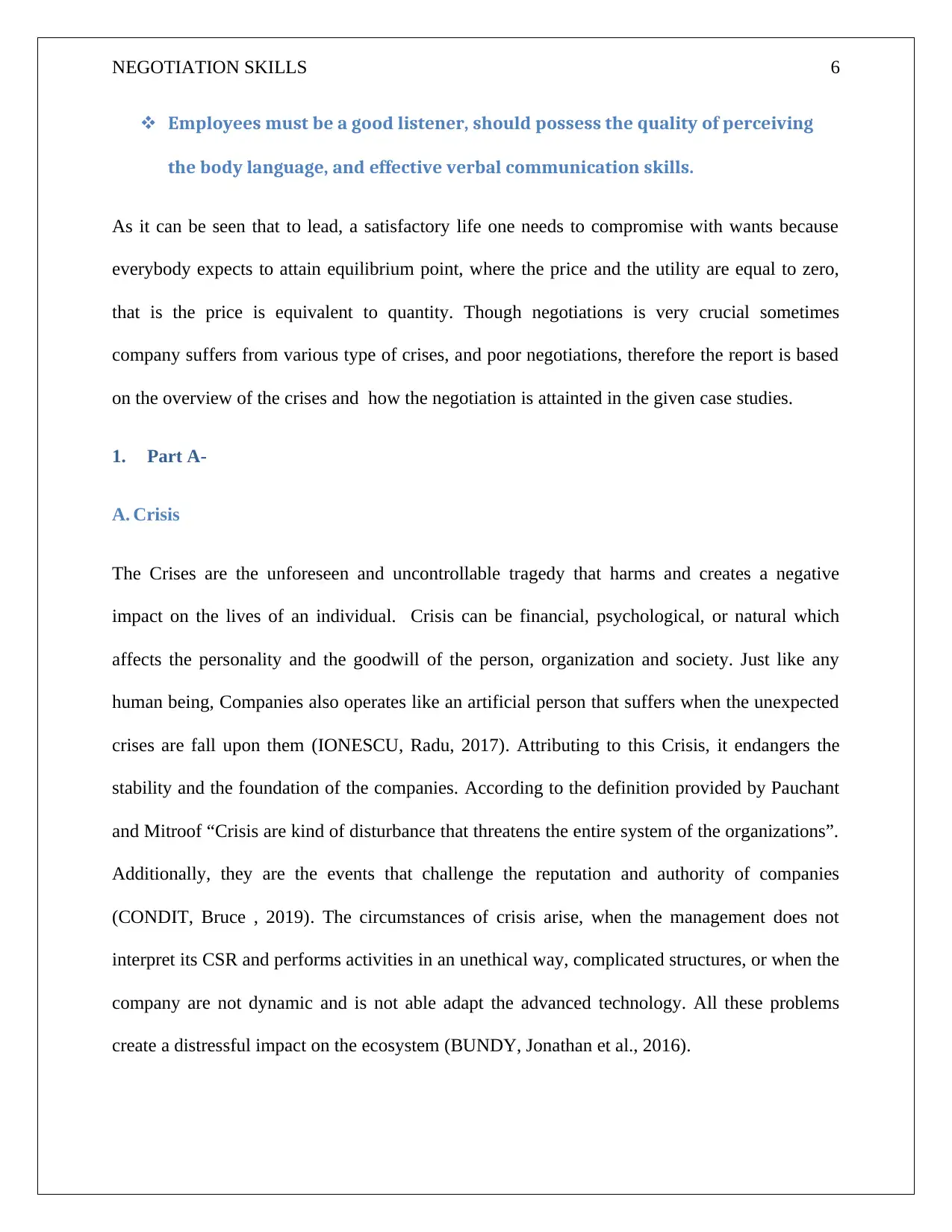
NEGOTIATION SKILLS 6
Employees must be a good listener, should possess the quality of perceiving
the body language, and effective verbal communication skills.
As it can be seen that to lead, a satisfactory life one needs to compromise with wants because
everybody expects to attain equilibrium point, where the price and the utility are equal to zero,
that is the price is equivalent to quantity. Though negotiations is very crucial sometimes
company suffers from various type of crises, and poor negotiations, therefore the report is based
on the overview of the crises and how the negotiation is attainted in the given case studies.
1. Part A-
A. Crisis
The Crises are the unforeseen and uncontrollable tragedy that harms and creates a negative
impact on the lives of an individual. Crisis can be financial, psychological, or natural which
affects the personality and the goodwill of the person, organization and society. Just like any
human being, Companies also operates like an artificial person that suffers when the unexpected
crises are fall upon them (IONESCU, Radu, 2017). Attributing to this Crisis, it endangers the
stability and the foundation of the companies. According to the definition provided by Pauchant
and Mitroof “Crisis are kind of disturbance that threatens the entire system of the organizations”.
Additionally, they are the events that challenge the reputation and authority of companies
(CONDIT, Bruce , 2019). The circumstances of crisis arise, when the management does not
interpret its CSR and performs activities in an unethical way, complicated structures, or when the
company are not dynamic and is not able adapt the advanced technology. All these problems
create a distressful impact on the ecosystem (BUNDY, Jonathan et al., 2016).
Employees must be a good listener, should possess the quality of perceiving
the body language, and effective verbal communication skills.
As it can be seen that to lead, a satisfactory life one needs to compromise with wants because
everybody expects to attain equilibrium point, where the price and the utility are equal to zero,
that is the price is equivalent to quantity. Though negotiations is very crucial sometimes
company suffers from various type of crises, and poor negotiations, therefore the report is based
on the overview of the crises and how the negotiation is attainted in the given case studies.
1. Part A-
A. Crisis
The Crises are the unforeseen and uncontrollable tragedy that harms and creates a negative
impact on the lives of an individual. Crisis can be financial, psychological, or natural which
affects the personality and the goodwill of the person, organization and society. Just like any
human being, Companies also operates like an artificial person that suffers when the unexpected
crises are fall upon them (IONESCU, Radu, 2017). Attributing to this Crisis, it endangers the
stability and the foundation of the companies. According to the definition provided by Pauchant
and Mitroof “Crisis are kind of disturbance that threatens the entire system of the organizations”.
Additionally, they are the events that challenge the reputation and authority of companies
(CONDIT, Bruce , 2019). The circumstances of crisis arise, when the management does not
interpret its CSR and performs activities in an unethical way, complicated structures, or when the
company are not dynamic and is not able adapt the advanced technology. All these problems
create a distressful impact on the ecosystem (BUNDY, Jonathan et al., 2016).
Paraphrase This Document
Need a fresh take? Get an instant paraphrase of this document with our AI Paraphraser
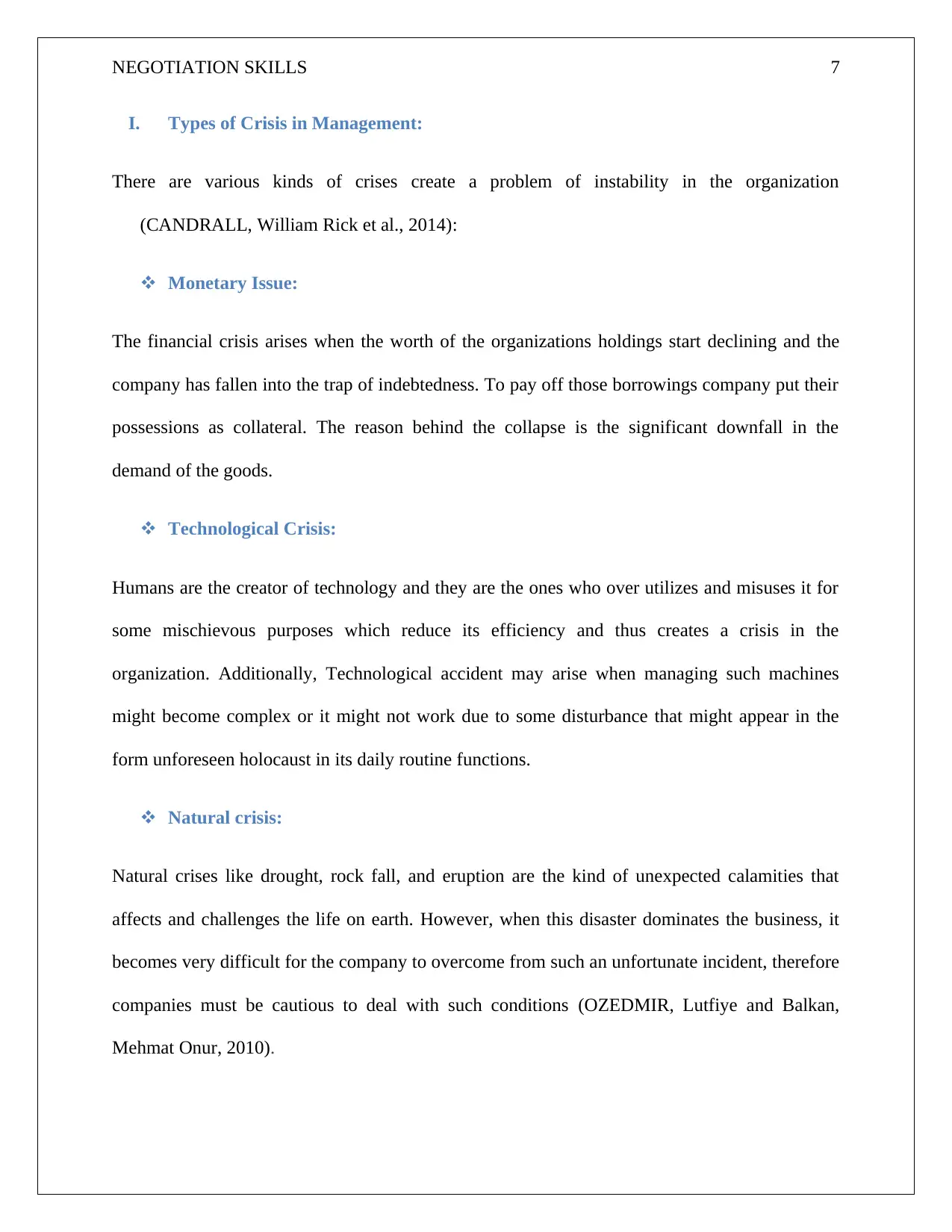
NEGOTIATION SKILLS 7
I. Types of Crisis in Management:
There are various kinds of crises create a problem of instability in the organization
(CANDRALL, William Rick et al., 2014):
Monetary Issue:
The financial crisis arises when the worth of the organizations holdings start declining and the
company has fallen into the trap of indebtedness. To pay off those borrowings company put their
possessions as collateral. The reason behind the collapse is the significant downfall in the
demand of the goods.
Technological Crisis:
Humans are the creator of technology and they are the ones who over utilizes and misuses it for
some mischievous purposes which reduce its efficiency and thus creates a crisis in the
organization. Additionally, Technological accident may arise when managing such machines
might become complex or it might not work due to some disturbance that might appear in the
form unforeseen holocaust in its daily routine functions.
Natural crisis:
Natural crises like drought, rock fall, and eruption are the kind of unexpected calamities that
affects and challenges the life on earth. However, when this disaster dominates the business, it
becomes very difficult for the company to overcome from such an unfortunate incident, therefore
companies must be cautious to deal with such conditions (OZEDMIR, Lutfiye and Balkan,
Mehmat Onur, 2010).
I. Types of Crisis in Management:
There are various kinds of crises create a problem of instability in the organization
(CANDRALL, William Rick et al., 2014):
Monetary Issue:
The financial crisis arises when the worth of the organizations holdings start declining and the
company has fallen into the trap of indebtedness. To pay off those borrowings company put their
possessions as collateral. The reason behind the collapse is the significant downfall in the
demand of the goods.
Technological Crisis:
Humans are the creator of technology and they are the ones who over utilizes and misuses it for
some mischievous purposes which reduce its efficiency and thus creates a crisis in the
organization. Additionally, Technological accident may arise when managing such machines
might become complex or it might not work due to some disturbance that might appear in the
form unforeseen holocaust in its daily routine functions.
Natural crisis:
Natural crises like drought, rock fall, and eruption are the kind of unexpected calamities that
affects and challenges the life on earth. However, when this disaster dominates the business, it
becomes very difficult for the company to overcome from such an unfortunate incident, therefore
companies must be cautious to deal with such conditions (OZEDMIR, Lutfiye and Balkan,
Mehmat Onur, 2010).
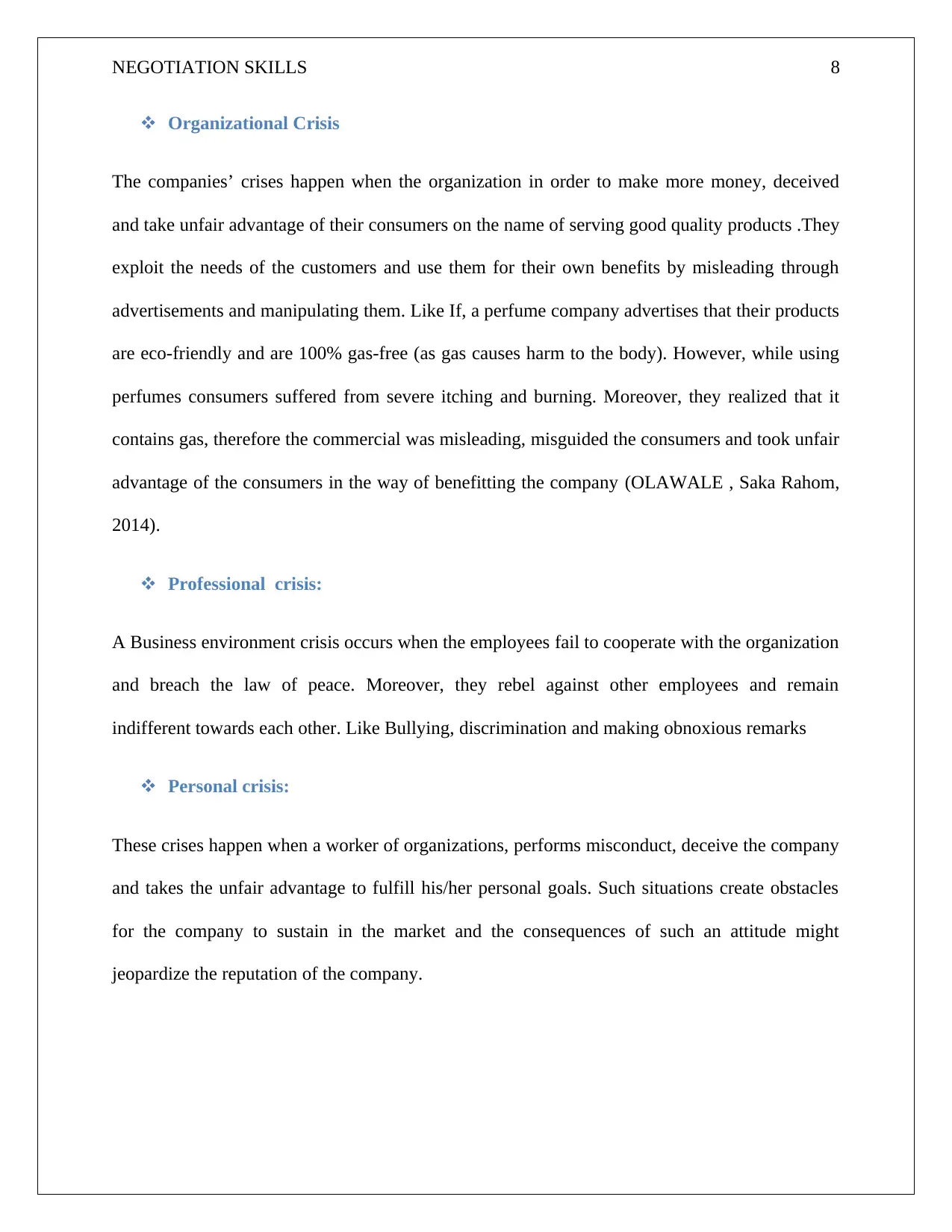
NEGOTIATION SKILLS 8
Organizational Crisis
The companies’ crises happen when the organization in order to make more money, deceived
and take unfair advantage of their consumers on the name of serving good quality products .They
exploit the needs of the customers and use them for their own benefits by misleading through
advertisements and manipulating them. Like If, a perfume company advertises that their products
are eco-friendly and are 100% gas-free (as gas causes harm to the body). However, while using
perfumes consumers suffered from severe itching and burning. Moreover, they realized that it
contains gas, therefore the commercial was misleading, misguided the consumers and took unfair
advantage of the consumers in the way of benefitting the company (OLAWALE , Saka Rahom,
2014).
Professional crisis:
A Business environment crisis occurs when the employees fail to cooperate with the organization
and breach the law of peace. Moreover, they rebel against other employees and remain
indifferent towards each other. Like Bullying, discrimination and making obnoxious remarks
Personal crisis:
These crises happen when a worker of organizations, performs misconduct, deceive the company
and takes the unfair advantage to fulfill his/her personal goals. Such situations create obstacles
for the company to sustain in the market and the consequences of such an attitude might
jeopardize the reputation of the company.
Organizational Crisis
The companies’ crises happen when the organization in order to make more money, deceived
and take unfair advantage of their consumers on the name of serving good quality products .They
exploit the needs of the customers and use them for their own benefits by misleading through
advertisements and manipulating them. Like If, a perfume company advertises that their products
are eco-friendly and are 100% gas-free (as gas causes harm to the body). However, while using
perfumes consumers suffered from severe itching and burning. Moreover, they realized that it
contains gas, therefore the commercial was misleading, misguided the consumers and took unfair
advantage of the consumers in the way of benefitting the company (OLAWALE , Saka Rahom,
2014).
Professional crisis:
A Business environment crisis occurs when the employees fail to cooperate with the organization
and breach the law of peace. Moreover, they rebel against other employees and remain
indifferent towards each other. Like Bullying, discrimination and making obnoxious remarks
Personal crisis:
These crises happen when a worker of organizations, performs misconduct, deceive the company
and takes the unfair advantage to fulfill his/her personal goals. Such situations create obstacles
for the company to sustain in the market and the consequences of such an attitude might
jeopardize the reputation of the company.
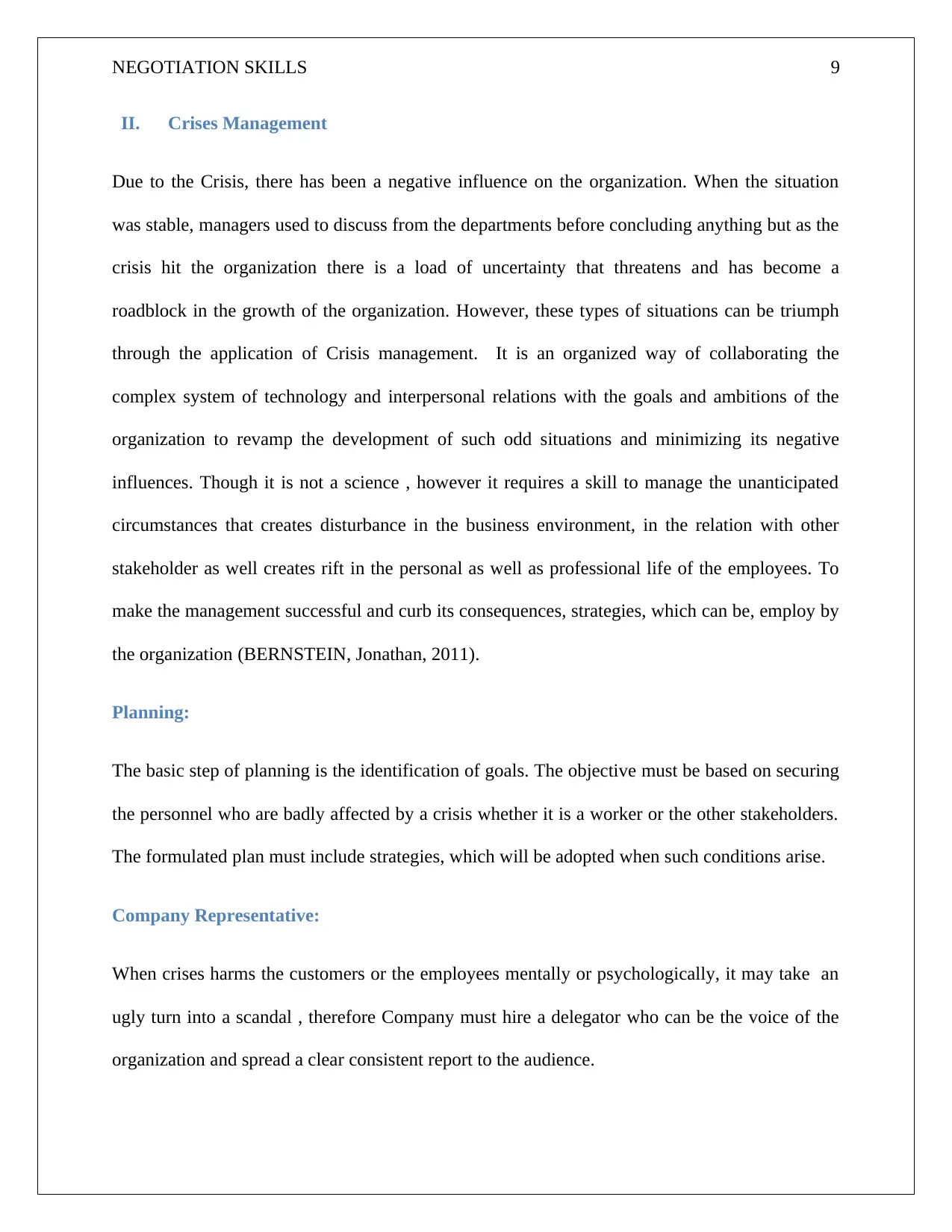
NEGOTIATION SKILLS 9
II. Crises Management
Due to the Crisis, there has been a negative influence on the organization. When the situation
was stable, managers used to discuss from the departments before concluding anything but as the
crisis hit the organization there is a load of uncertainty that threatens and has become a
roadblock in the growth of the organization. However, these types of situations can be triumph
through the application of Crisis management. It is an organized way of collaborating the
complex system of technology and interpersonal relations with the goals and ambitions of the
organization to revamp the development of such odd situations and minimizing its negative
influences. Though it is not a science , however it requires a skill to manage the unanticipated
circumstances that creates disturbance in the business environment, in the relation with other
stakeholder as well creates rift in the personal as well as professional life of the employees. To
make the management successful and curb its consequences, strategies, which can be, employ by
the organization (BERNSTEIN, Jonathan, 2011).
Planning:
The basic step of planning is the identification of goals. The objective must be based on securing
the personnel who are badly affected by a crisis whether it is a worker or the other stakeholders.
The formulated plan must include strategies, which will be adopted when such conditions arise.
Company Representative:
When crises harms the customers or the employees mentally or psychologically, it may take an
ugly turn into a scandal , therefore Company must hire a delegator who can be the voice of the
organization and spread a clear consistent report to the audience.
II. Crises Management
Due to the Crisis, there has been a negative influence on the organization. When the situation
was stable, managers used to discuss from the departments before concluding anything but as the
crisis hit the organization there is a load of uncertainty that threatens and has become a
roadblock in the growth of the organization. However, these types of situations can be triumph
through the application of Crisis management. It is an organized way of collaborating the
complex system of technology and interpersonal relations with the goals and ambitions of the
organization to revamp the development of such odd situations and minimizing its negative
influences. Though it is not a science , however it requires a skill to manage the unanticipated
circumstances that creates disturbance in the business environment, in the relation with other
stakeholder as well creates rift in the personal as well as professional life of the employees. To
make the management successful and curb its consequences, strategies, which can be, employ by
the organization (BERNSTEIN, Jonathan, 2011).
Planning:
The basic step of planning is the identification of goals. The objective must be based on securing
the personnel who are badly affected by a crisis whether it is a worker or the other stakeholders.
The formulated plan must include strategies, which will be adopted when such conditions arise.
Company Representative:
When crises harms the customers or the employees mentally or psychologically, it may take an
ugly turn into a scandal , therefore Company must hire a delegator who can be the voice of the
organization and spread a clear consistent report to the audience.
Secure Best Marks with AI Grader
Need help grading? Try our AI Grader for instant feedback on your assignments.
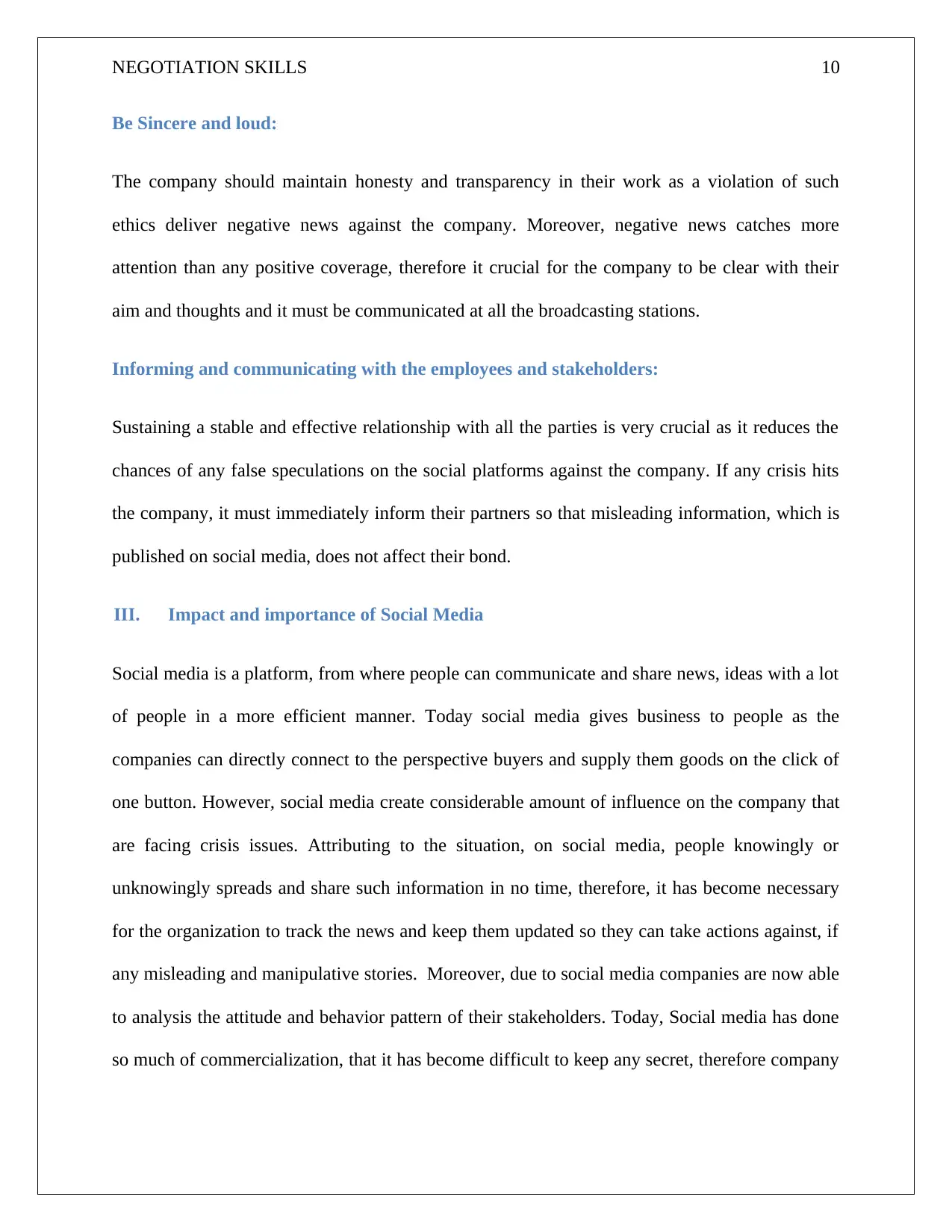
NEGOTIATION SKILLS 10
Be Sincere and loud:
The company should maintain honesty and transparency in their work as a violation of such
ethics deliver negative news against the company. Moreover, negative news catches more
attention than any positive coverage, therefore it crucial for the company to be clear with their
aim and thoughts and it must be communicated at all the broadcasting stations.
Informing and communicating with the employees and stakeholders:
Sustaining a stable and effective relationship with all the parties is very crucial as it reduces the
chances of any false speculations on the social platforms against the company. If any crisis hits
the company, it must immediately inform their partners so that misleading information, which is
published on social media, does not affect their bond.
III. Impact and importance of Social Media
Social media is a platform, from where people can communicate and share news, ideas with a lot
of people in a more efficient manner. Today social media gives business to people as the
companies can directly connect to the perspective buyers and supply them goods on the click of
one button. However, social media create considerable amount of influence on the company that
are facing crisis issues. Attributing to the situation, on social media, people knowingly or
unknowingly spreads and share such information in no time, therefore, it has become necessary
for the organization to track the news and keep them updated so they can take actions against, if
any misleading and manipulative stories. Moreover, due to social media companies are now able
to analysis the attitude and behavior pattern of their stakeholders. Today, Social media has done
so much of commercialization, that it has become difficult to keep any secret, therefore company
Be Sincere and loud:
The company should maintain honesty and transparency in their work as a violation of such
ethics deliver negative news against the company. Moreover, negative news catches more
attention than any positive coverage, therefore it crucial for the company to be clear with their
aim and thoughts and it must be communicated at all the broadcasting stations.
Informing and communicating with the employees and stakeholders:
Sustaining a stable and effective relationship with all the parties is very crucial as it reduces the
chances of any false speculations on the social platforms against the company. If any crisis hits
the company, it must immediately inform their partners so that misleading information, which is
published on social media, does not affect their bond.
III. Impact and importance of Social Media
Social media is a platform, from where people can communicate and share news, ideas with a lot
of people in a more efficient manner. Today social media gives business to people as the
companies can directly connect to the perspective buyers and supply them goods on the click of
one button. However, social media create considerable amount of influence on the company that
are facing crisis issues. Attributing to the situation, on social media, people knowingly or
unknowingly spreads and share such information in no time, therefore, it has become necessary
for the organization to track the news and keep them updated so they can take actions against, if
any misleading and manipulative stories. Moreover, due to social media companies are now able
to analysis the attitude and behavior pattern of their stakeholders. Today, Social media has done
so much of commercialization, that it has become difficult to keep any secret, therefore company
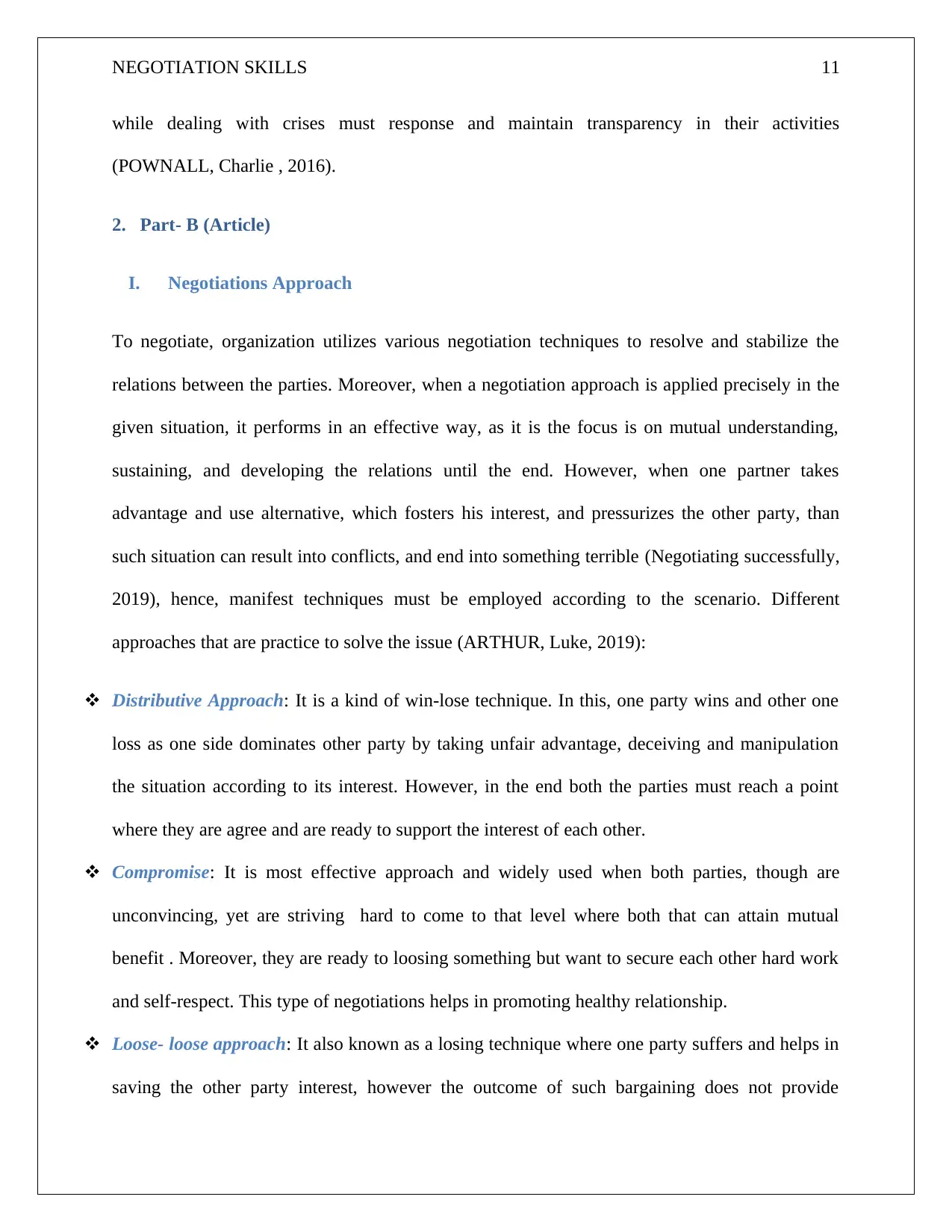
NEGOTIATION SKILLS 11
while dealing with crises must response and maintain transparency in their activities
(POWNALL, Charlie , 2016).
2. Part- B (Article)
I. Negotiations Approach
To negotiate, organization utilizes various negotiation techniques to resolve and stabilize the
relations between the parties. Moreover, when a negotiation approach is applied precisely in the
given situation, it performs in an effective way, as it is the focus is on mutual understanding,
sustaining, and developing the relations until the end. However, when one partner takes
advantage and use alternative, which fosters his interest, and pressurizes the other party, than
such situation can result into conflicts, and end into something terrible (Negotiating successfully,
2019), hence, manifest techniques must be employed according to the scenario. Different
approaches that are practice to solve the issue (ARTHUR, Luke, 2019):
Distributive Approach: It is a kind of win-lose technique. In this, one party wins and other one
loss as one side dominates other party by taking unfair advantage, deceiving and manipulation
the situation according to its interest. However, in the end both the parties must reach a point
where they are agree and are ready to support the interest of each other.
Compromise: It is most effective approach and widely used when both parties, though are
unconvincing, yet are striving hard to come to that level where both that can attain mutual
benefit . Moreover, they are ready to loosing something but want to secure each other hard work
and self-respect. This type of negotiations helps in promoting healthy relationship.
Loose- loose approach: It also known as a losing technique where one party suffers and helps in
saving the other party interest, however the outcome of such bargaining does not provide
while dealing with crises must response and maintain transparency in their activities
(POWNALL, Charlie , 2016).
2. Part- B (Article)
I. Negotiations Approach
To negotiate, organization utilizes various negotiation techniques to resolve and stabilize the
relations between the parties. Moreover, when a negotiation approach is applied precisely in the
given situation, it performs in an effective way, as it is the focus is on mutual understanding,
sustaining, and developing the relations until the end. However, when one partner takes
advantage and use alternative, which fosters his interest, and pressurizes the other party, than
such situation can result into conflicts, and end into something terrible (Negotiating successfully,
2019), hence, manifest techniques must be employed according to the scenario. Different
approaches that are practice to solve the issue (ARTHUR, Luke, 2019):
Distributive Approach: It is a kind of win-lose technique. In this, one party wins and other one
loss as one side dominates other party by taking unfair advantage, deceiving and manipulation
the situation according to its interest. However, in the end both the parties must reach a point
where they are agree and are ready to support the interest of each other.
Compromise: It is most effective approach and widely used when both parties, though are
unconvincing, yet are striving hard to come to that level where both that can attain mutual
benefit . Moreover, they are ready to loosing something but want to secure each other hard work
and self-respect. This type of negotiations helps in promoting healthy relationship.
Loose- loose approach: It also known as a losing technique where one party suffers and helps in
saving the other party interest, however the outcome of such bargaining does not provide
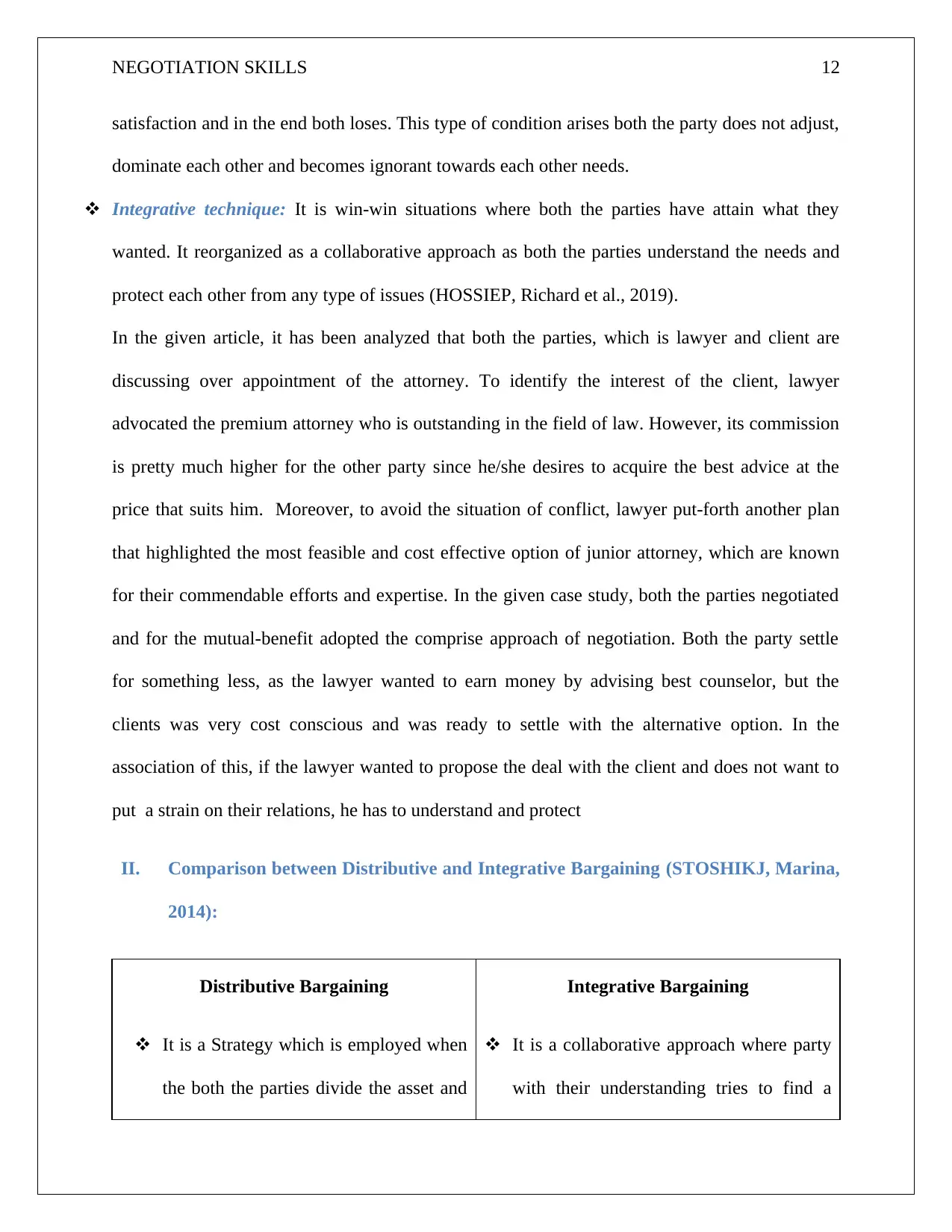
NEGOTIATION SKILLS 12
satisfaction and in the end both loses. This type of condition arises both the party does not adjust,
dominate each other and becomes ignorant towards each other needs.
Integrative technique: It is win-win situations where both the parties have attain what they
wanted. It reorganized as a collaborative approach as both the parties understand the needs and
protect each other from any type of issues (HOSSIEP, Richard et al., 2019).
In the given article, it has been analyzed that both the parties, which is lawyer and client are
discussing over appointment of the attorney. To identify the interest of the client, lawyer
advocated the premium attorney who is outstanding in the field of law. However, its commission
is pretty much higher for the other party since he/she desires to acquire the best advice at the
price that suits him. Moreover, to avoid the situation of conflict, lawyer put-forth another plan
that highlighted the most feasible and cost effective option of junior attorney, which are known
for their commendable efforts and expertise. In the given case study, both the parties negotiated
and for the mutual-benefit adopted the comprise approach of negotiation. Both the party settle
for something less, as the lawyer wanted to earn money by advising best counselor, but the
clients was very cost conscious and was ready to settle with the alternative option. In the
association of this, if the lawyer wanted to propose the deal with the client and does not want to
put a strain on their relations, he has to understand and protect
II. Comparison between Distributive and Integrative Bargaining (STOSHIKJ, Marina,
2014):
Distributive Bargaining
It is a Strategy which is employed when
the both the parties divide the asset and
Integrative Bargaining
It is a collaborative approach where party
with their understanding tries to find a
satisfaction and in the end both loses. This type of condition arises both the party does not adjust,
dominate each other and becomes ignorant towards each other needs.
Integrative technique: It is win-win situations where both the parties have attain what they
wanted. It reorganized as a collaborative approach as both the parties understand the needs and
protect each other from any type of issues (HOSSIEP, Richard et al., 2019).
In the given article, it has been analyzed that both the parties, which is lawyer and client are
discussing over appointment of the attorney. To identify the interest of the client, lawyer
advocated the premium attorney who is outstanding in the field of law. However, its commission
is pretty much higher for the other party since he/she desires to acquire the best advice at the
price that suits him. Moreover, to avoid the situation of conflict, lawyer put-forth another plan
that highlighted the most feasible and cost effective option of junior attorney, which are known
for their commendable efforts and expertise. In the given case study, both the parties negotiated
and for the mutual-benefit adopted the comprise approach of negotiation. Both the party settle
for something less, as the lawyer wanted to earn money by advising best counselor, but the
clients was very cost conscious and was ready to settle with the alternative option. In the
association of this, if the lawyer wanted to propose the deal with the client and does not want to
put a strain on their relations, he has to understand and protect
II. Comparison between Distributive and Integrative Bargaining (STOSHIKJ, Marina,
2014):
Distributive Bargaining
It is a Strategy which is employed when
the both the parties divide the asset and
Integrative Bargaining
It is a collaborative approach where party
with their understanding tries to find a
Paraphrase This Document
Need a fresh take? Get an instant paraphrase of this document with our AI Paraphraser
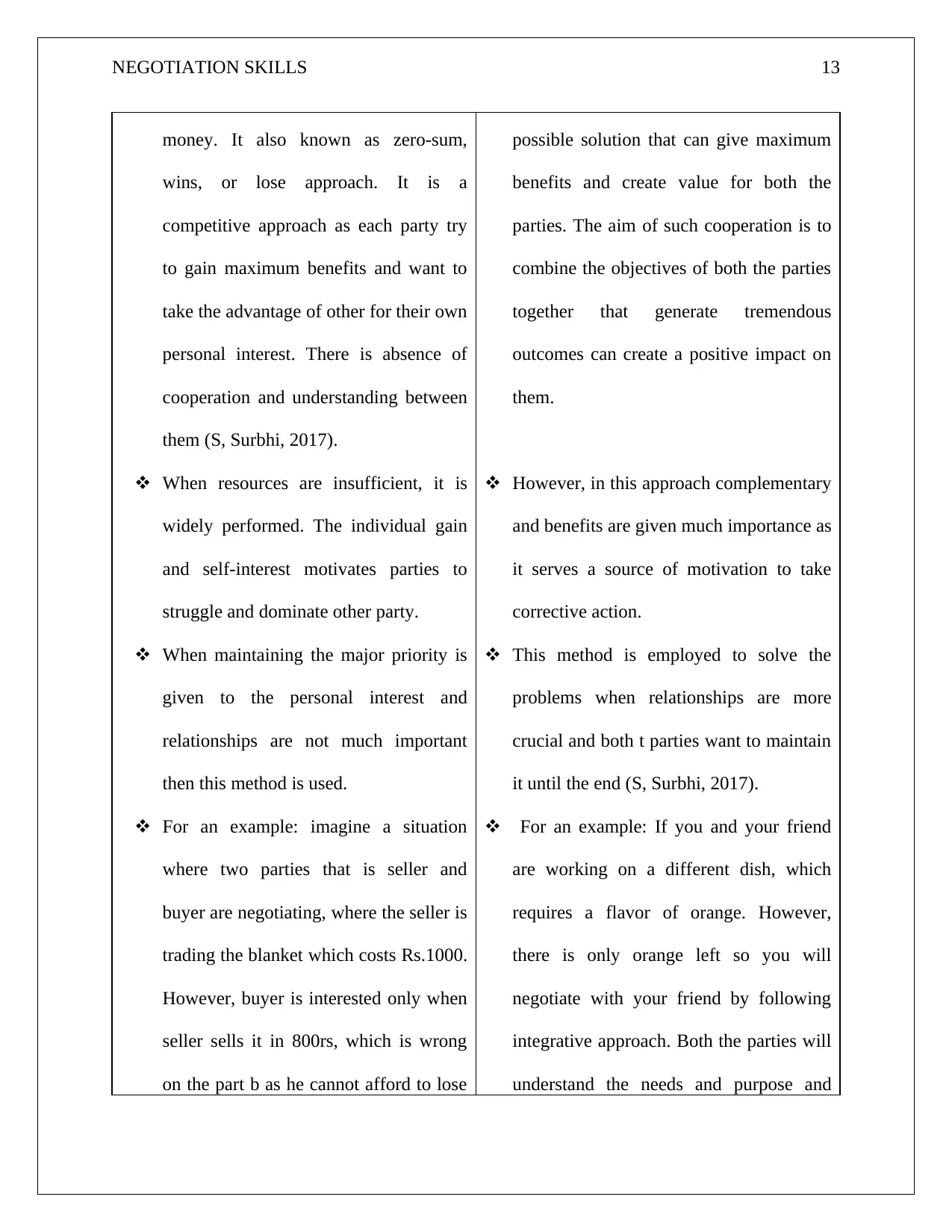
NEGOTIATION SKILLS 13
money. It also known as zero-sum,
wins, or lose approach. It is a
competitive approach as each party try
to gain maximum benefits and want to
take the advantage of other for their own
personal interest. There is absence of
cooperation and understanding between
them (S, Surbhi, 2017).
When resources are insufficient, it is
widely performed. The individual gain
and self-interest motivates parties to
struggle and dominate other party.
When maintaining the major priority is
given to the personal interest and
relationships are not much important
then this method is used.
For an example: imagine a situation
where two parties that is seller and
buyer are negotiating, where the seller is
trading the blanket which costs Rs.1000.
However, buyer is interested only when
seller sells it in 800rs, which is wrong
on the part b as he cannot afford to lose
possible solution that can give maximum
benefits and create value for both the
parties. The aim of such cooperation is to
combine the objectives of both the parties
together that generate tremendous
outcomes can create a positive impact on
them.
However, in this approach complementary
and benefits are given much importance as
it serves a source of motivation to take
corrective action.
This method is employed to solve the
problems when relationships are more
crucial and both t parties want to maintain
it until the end (S, Surbhi, 2017).
For an example: If you and your friend
are working on a different dish, which
requires a flavor of orange. However,
there is only orange left so you will
negotiate with your friend by following
integrative approach. Both the parties will
understand the needs and purpose and
money. It also known as zero-sum,
wins, or lose approach. It is a
competitive approach as each party try
to gain maximum benefits and want to
take the advantage of other for their own
personal interest. There is absence of
cooperation and understanding between
them (S, Surbhi, 2017).
When resources are insufficient, it is
widely performed. The individual gain
and self-interest motivates parties to
struggle and dominate other party.
When maintaining the major priority is
given to the personal interest and
relationships are not much important
then this method is used.
For an example: imagine a situation
where two parties that is seller and
buyer are negotiating, where the seller is
trading the blanket which costs Rs.1000.
However, buyer is interested only when
seller sells it in 800rs, which is wrong
on the part b as he cannot afford to lose
possible solution that can give maximum
benefits and create value for both the
parties. The aim of such cooperation is to
combine the objectives of both the parties
together that generate tremendous
outcomes can create a positive impact on
them.
However, in this approach complementary
and benefits are given much importance as
it serves a source of motivation to take
corrective action.
This method is employed to solve the
problems when relationships are more
crucial and both t parties want to maintain
it until the end (S, Surbhi, 2017).
For an example: If you and your friend
are working on a different dish, which
requires a flavor of orange. However,
there is only orange left so you will
negotiate with your friend by following
integrative approach. Both the parties will
understand the needs and purpose and
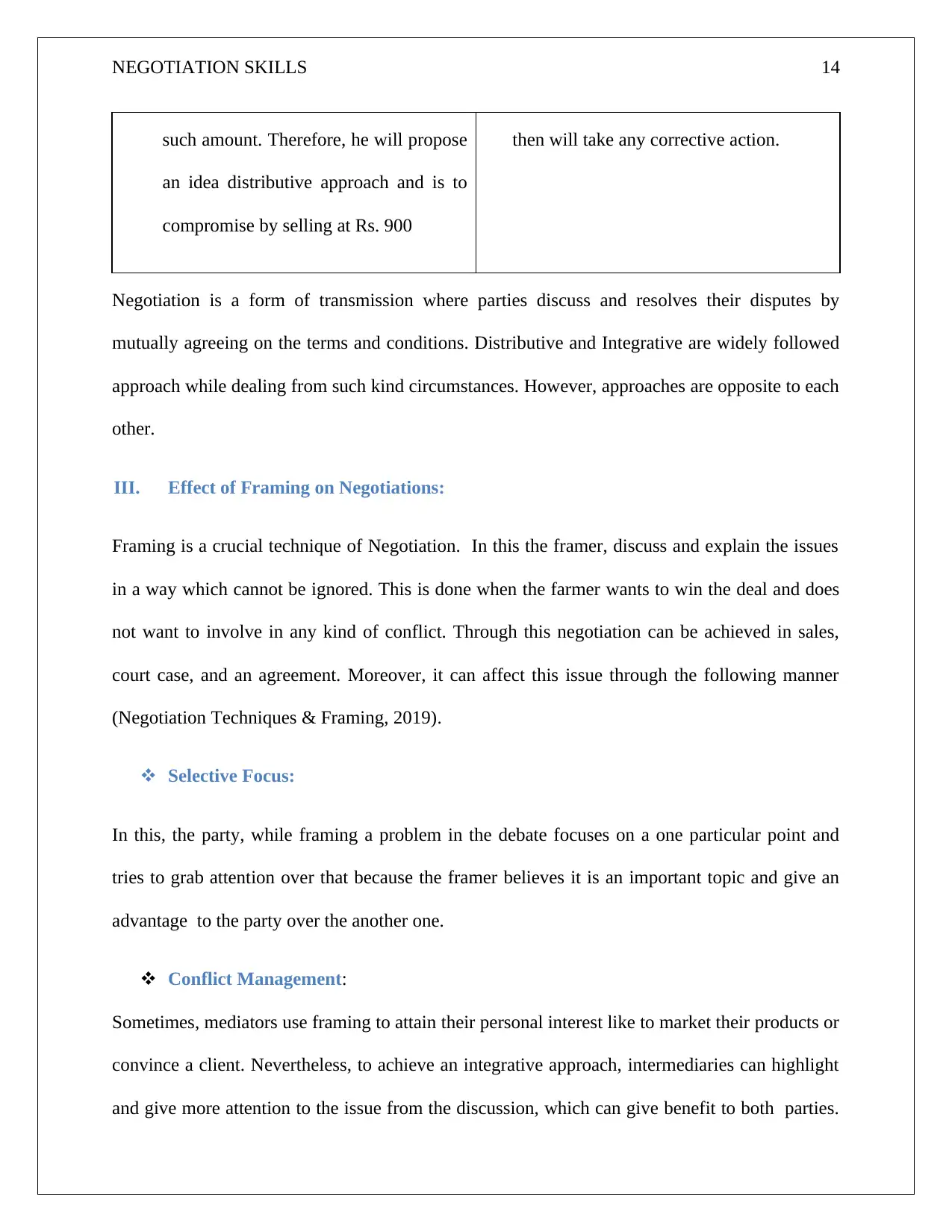
NEGOTIATION SKILLS 14
such amount. Therefore, he will propose
an idea distributive approach and is to
compromise by selling at Rs. 900
then will take any corrective action.
Negotiation is a form of transmission where parties discuss and resolves their disputes by
mutually agreeing on the terms and conditions. Distributive and Integrative are widely followed
approach while dealing from such kind circumstances. However, approaches are opposite to each
other.
III. Effect of Framing on Negotiations:
Framing is a crucial technique of Negotiation. In this the framer, discuss and explain the issues
in a way which cannot be ignored. This is done when the farmer wants to win the deal and does
not want to involve in any kind of conflict. Through this negotiation can be achieved in sales,
court case, and an agreement. Moreover, it can affect this issue through the following manner
(Negotiation Techniques & Framing, 2019).
Selective Focus:
In this, the party, while framing a problem in the debate focuses on a one particular point and
tries to grab attention over that because the framer believes it is an important topic and give an
advantage to the party over the another one.
Conflict Management:
Sometimes, mediators use framing to attain their personal interest like to market their products or
convince a client. Nevertheless, to achieve an integrative approach, intermediaries can highlight
and give more attention to the issue from the discussion, which can give benefit to both parties.
such amount. Therefore, he will propose
an idea distributive approach and is to
compromise by selling at Rs. 900
then will take any corrective action.
Negotiation is a form of transmission where parties discuss and resolves their disputes by
mutually agreeing on the terms and conditions. Distributive and Integrative are widely followed
approach while dealing from such kind circumstances. However, approaches are opposite to each
other.
III. Effect of Framing on Negotiations:
Framing is a crucial technique of Negotiation. In this the framer, discuss and explain the issues
in a way which cannot be ignored. This is done when the farmer wants to win the deal and does
not want to involve in any kind of conflict. Through this negotiation can be achieved in sales,
court case, and an agreement. Moreover, it can affect this issue through the following manner
(Negotiation Techniques & Framing, 2019).
Selective Focus:
In this, the party, while framing a problem in the debate focuses on a one particular point and
tries to grab attention over that because the framer believes it is an important topic and give an
advantage to the party over the another one.
Conflict Management:
Sometimes, mediators use framing to attain their personal interest like to market their products or
convince a client. Nevertheless, to achieve an integrative approach, intermediaries can highlight
and give more attention to the issue from the discussion, which can give benefit to both parties.

NEGOTIATION SKILLS 15
It is also advocated by avoiding any dispute, negotiator can make necessary changes and then
he /she focuses on proposing the negotiation, which can result in a better outcome.
3. Part C (Case Study)
I. Role of Culture in the Negotiation process
Today, every country is becoming an independent and contributing towards peace in society.
Moreover, due to globalization, and to make the world poverty-free, all countries are coming
together to develop the underdeveloped countries (LIU, Meina , 2011). It can be observed that,
Countries with different cultures negotiate on a daily bases, so they can make a change in the
society. Many renowned authors believe culture does influence communication decisions. Self-
introspection, circumstances, behavior pattern, language all these factors affects the procedure of
negotiation. Moreover, the difference in the culture can give rise to the problems like clashes in
their personality and thinking, language barriers, lack of mutual understanding (LUTHANS, Fred
and Dhoh, Jhonathan P, 2012). In the given case study Americans and Japanese which are the
international business partners. However, due to change in the prices their relation was affected.
Hence, it is very important to understand culture influences (CARLSNAES, Walter et al., 2013).
i. Japanese Culture V/S Australian Culture
Australian associates judge their foreign delegates on the bases of their punctuality and expects
them to be on time (Negotiating International Business - Australia, 2008). Being late without
any valid reasons might consider as offence on their part. On Japanese part they believe to work
in a very organized way and does not believe in secret surprises and are very punctual towards
their work (Punctuality: The Japanese way of business, 2007) . They are very predictable and
have a consistent attitude towards everything (LEWIS, Richard, 2014).
It is also advocated by avoiding any dispute, negotiator can make necessary changes and then
he /she focuses on proposing the negotiation, which can result in a better outcome.
3. Part C (Case Study)
I. Role of Culture in the Negotiation process
Today, every country is becoming an independent and contributing towards peace in society.
Moreover, due to globalization, and to make the world poverty-free, all countries are coming
together to develop the underdeveloped countries (LIU, Meina , 2011). It can be observed that,
Countries with different cultures negotiate on a daily bases, so they can make a change in the
society. Many renowned authors believe culture does influence communication decisions. Self-
introspection, circumstances, behavior pattern, language all these factors affects the procedure of
negotiation. Moreover, the difference in the culture can give rise to the problems like clashes in
their personality and thinking, language barriers, lack of mutual understanding (LUTHANS, Fred
and Dhoh, Jhonathan P, 2012). In the given case study Americans and Japanese which are the
international business partners. However, due to change in the prices their relation was affected.
Hence, it is very important to understand culture influences (CARLSNAES, Walter et al., 2013).
i. Japanese Culture V/S Australian Culture
Australian associates judge their foreign delegates on the bases of their punctuality and expects
them to be on time (Negotiating International Business - Australia, 2008). Being late without
any valid reasons might consider as offence on their part. On Japanese part they believe to work
in a very organized way and does not believe in secret surprises and are very punctual towards
their work (Punctuality: The Japanese way of business, 2007) . They are very predictable and
have a consistent attitude towards everything (LEWIS, Richard, 2014).
Secure Best Marks with AI Grader
Need help grading? Try our AI Grader for instant feedback on your assignments.
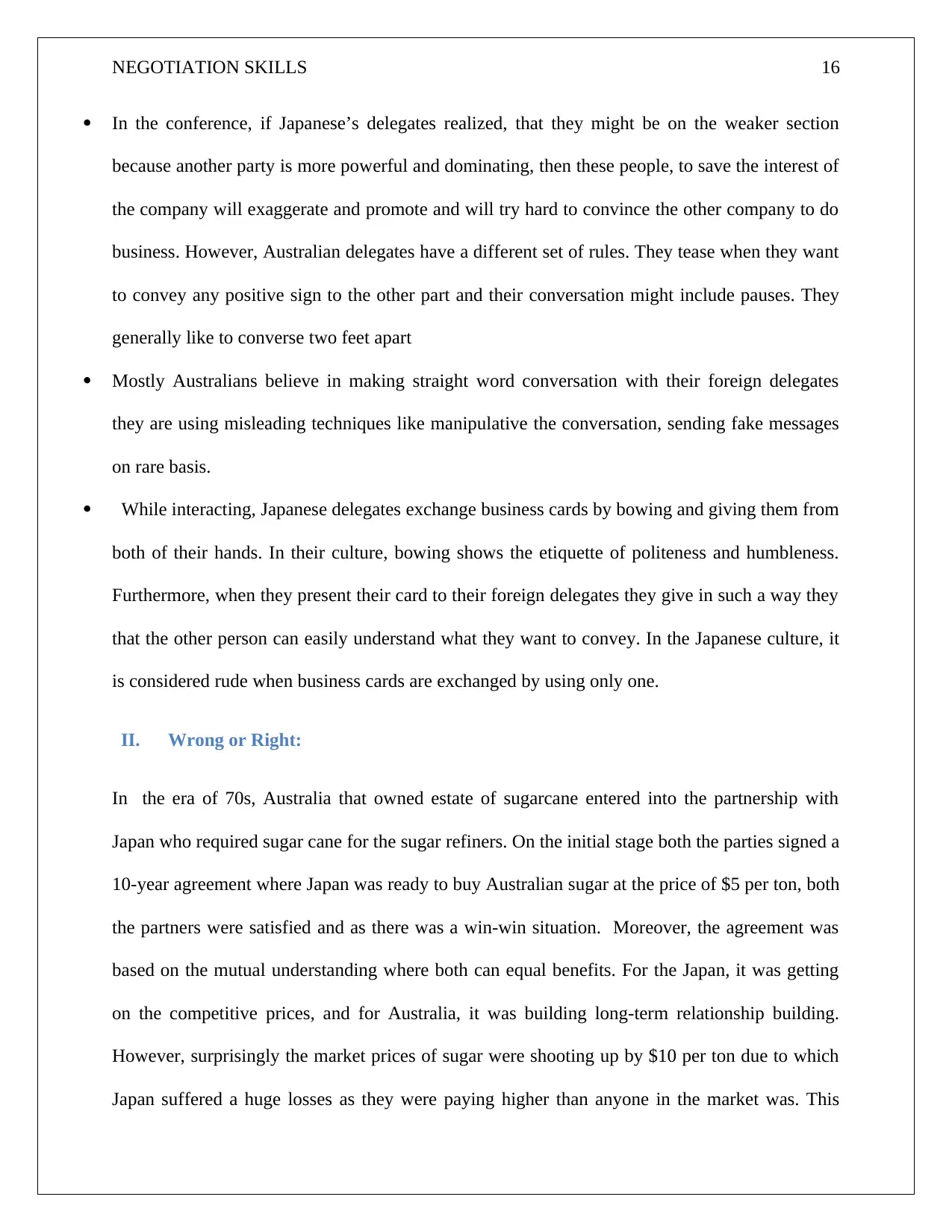
NEGOTIATION SKILLS 16
In the conference, if Japanese’s delegates realized, that they might be on the weaker section
because another party is more powerful and dominating, then these people, to save the interest of
the company will exaggerate and promote and will try hard to convince the other company to do
business. However, Australian delegates have a different set of rules. They tease when they want
to convey any positive sign to the other part and their conversation might include pauses. They
generally like to converse two feet apart
Mostly Australians believe in making straight word conversation with their foreign delegates
they are using misleading techniques like manipulative the conversation, sending fake messages
on rare basis.
While interacting, Japanese delegates exchange business cards by bowing and giving them from
both of their hands. In their culture, bowing shows the etiquette of politeness and humbleness.
Furthermore, when they present their card to their foreign delegates they give in such a way they
that the other person can easily understand what they want to convey. In the Japanese culture, it
is considered rude when business cards are exchanged by using only one.
II. Wrong or Right:
In the era of 70s, Australia that owned estate of sugarcane entered into the partnership with
Japan who required sugar cane for the sugar refiners. On the initial stage both the parties signed a
10-year agreement where Japan was ready to buy Australian sugar at the price of $5 per ton, both
the partners were satisfied and as there was a win-win situation. Moreover, the agreement was
based on the mutual understanding where both can equal benefits. For the Japan, it was getting
on the competitive prices, and for Australia, it was building long-term relationship building.
However, surprisingly the market prices of sugar were shooting up by $10 per ton due to which
Japan suffered a huge losses as they were paying higher than anyone in the market was. This
In the conference, if Japanese’s delegates realized, that they might be on the weaker section
because another party is more powerful and dominating, then these people, to save the interest of
the company will exaggerate and promote and will try hard to convince the other company to do
business. However, Australian delegates have a different set of rules. They tease when they want
to convey any positive sign to the other part and their conversation might include pauses. They
generally like to converse two feet apart
Mostly Australians believe in making straight word conversation with their foreign delegates
they are using misleading techniques like manipulative the conversation, sending fake messages
on rare basis.
While interacting, Japanese delegates exchange business cards by bowing and giving them from
both of their hands. In their culture, bowing shows the etiquette of politeness and humbleness.
Furthermore, when they present their card to their foreign delegates they give in such a way they
that the other person can easily understand what they want to convey. In the Japanese culture, it
is considered rude when business cards are exchanged by using only one.
II. Wrong or Right:
In the era of 70s, Australia that owned estate of sugarcane entered into the partnership with
Japan who required sugar cane for the sugar refiners. On the initial stage both the parties signed a
10-year agreement where Japan was ready to buy Australian sugar at the price of $5 per ton, both
the partners were satisfied and as there was a win-win situation. Moreover, the agreement was
based on the mutual understanding where both can equal benefits. For the Japan, it was getting
on the competitive prices, and for Australia, it was building long-term relationship building.
However, surprisingly the market prices of sugar were shooting up by $10 per ton due to which
Japan suffered a huge losses as they were paying higher than anyone in the market was. This
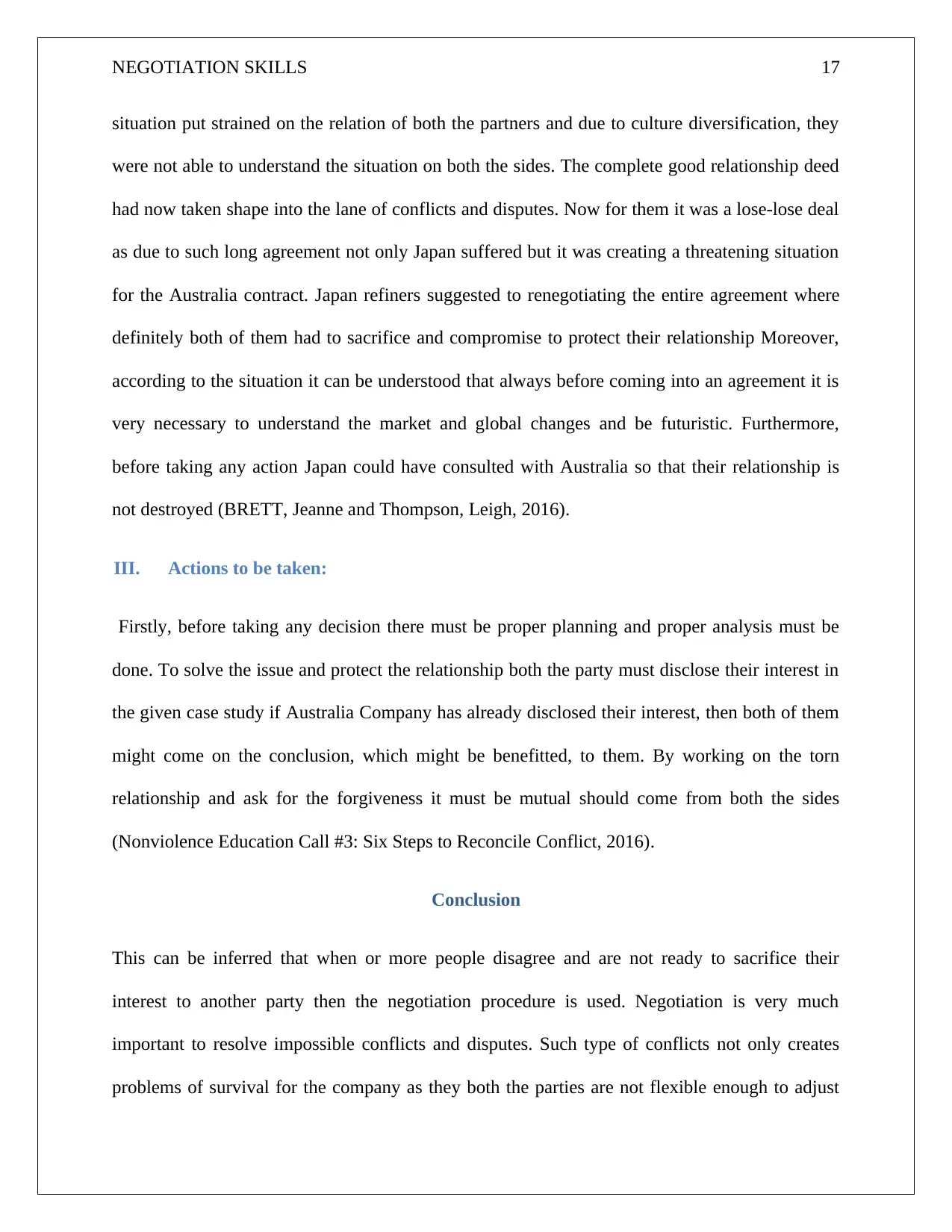
NEGOTIATION SKILLS 17
situation put strained on the relation of both the partners and due to culture diversification, they
were not able to understand the situation on both the sides. The complete good relationship deed
had now taken shape into the lane of conflicts and disputes. Now for them it was a lose-lose deal
as due to such long agreement not only Japan suffered but it was creating a threatening situation
for the Australia contract. Japan refiners suggested to renegotiating the entire agreement where
definitely both of them had to sacrifice and compromise to protect their relationship Moreover,
according to the situation it can be understood that always before coming into an agreement it is
very necessary to understand the market and global changes and be futuristic. Furthermore,
before taking any action Japan could have consulted with Australia so that their relationship is
not destroyed (BRETT, Jeanne and Thompson, Leigh, 2016).
III. Actions to be taken:
Firstly, before taking any decision there must be proper planning and proper analysis must be
done. To solve the issue and protect the relationship both the party must disclose their interest in
the given case study if Australia Company has already disclosed their interest, then both of them
might come on the conclusion, which might be benefitted, to them. By working on the torn
relationship and ask for the forgiveness it must be mutual should come from both the sides
(Nonviolence Education Call #3: Six Steps to Reconcile Conflict, 2016).
Conclusion
This can be inferred that when or more people disagree and are not ready to sacrifice their
interest to another party then the negotiation procedure is used. Negotiation is very much
important to resolve impossible conflicts and disputes. Such type of conflicts not only creates
problems of survival for the company as they both the parties are not flexible enough to adjust
situation put strained on the relation of both the partners and due to culture diversification, they
were not able to understand the situation on both the sides. The complete good relationship deed
had now taken shape into the lane of conflicts and disputes. Now for them it was a lose-lose deal
as due to such long agreement not only Japan suffered but it was creating a threatening situation
for the Australia contract. Japan refiners suggested to renegotiating the entire agreement where
definitely both of them had to sacrifice and compromise to protect their relationship Moreover,
according to the situation it can be understood that always before coming into an agreement it is
very necessary to understand the market and global changes and be futuristic. Furthermore,
before taking any action Japan could have consulted with Australia so that their relationship is
not destroyed (BRETT, Jeanne and Thompson, Leigh, 2016).
III. Actions to be taken:
Firstly, before taking any decision there must be proper planning and proper analysis must be
done. To solve the issue and protect the relationship both the party must disclose their interest in
the given case study if Australia Company has already disclosed their interest, then both of them
might come on the conclusion, which might be benefitted, to them. By working on the torn
relationship and ask for the forgiveness it must be mutual should come from both the sides
(Nonviolence Education Call #3: Six Steps to Reconcile Conflict, 2016).
Conclusion
This can be inferred that when or more people disagree and are not ready to sacrifice their
interest to another party then the negotiation procedure is used. Negotiation is very much
important to resolve impossible conflicts and disputes. Such type of conflicts not only creates
problems of survival for the company as they both the parties are not flexible enough to adjust
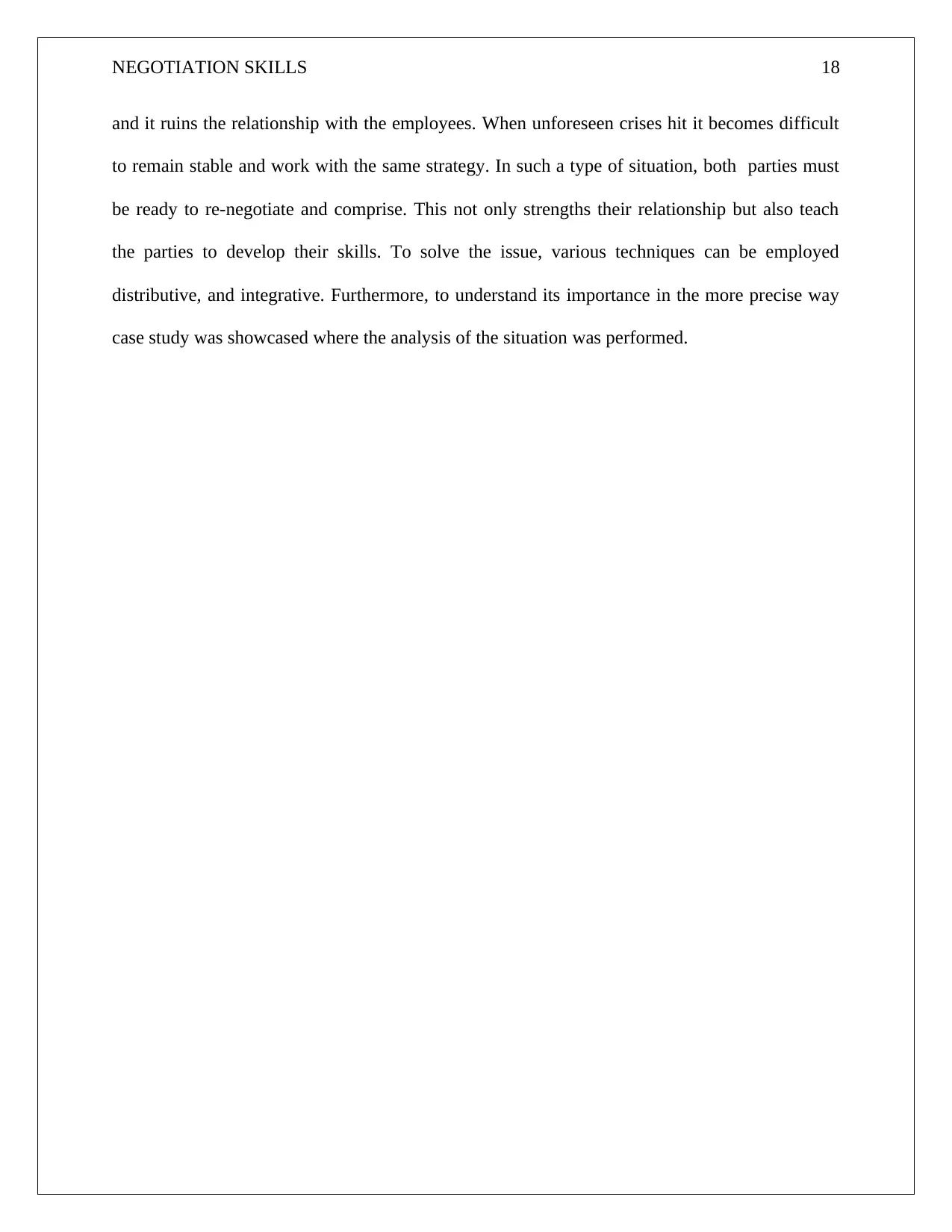
NEGOTIATION SKILLS 18
and it ruins the relationship with the employees. When unforeseen crises hit it becomes difficult
to remain stable and work with the same strategy. In such a type of situation, both parties must
be ready to re-negotiate and comprise. This not only strengths their relationship but also teach
the parties to develop their skills. To solve the issue, various techniques can be employed
distributive, and integrative. Furthermore, to understand its importance in the more precise way
case study was showcased where the analysis of the situation was performed.
and it ruins the relationship with the employees. When unforeseen crises hit it becomes difficult
to remain stable and work with the same strategy. In such a type of situation, both parties must
be ready to re-negotiate and comprise. This not only strengths their relationship but also teach
the parties to develop their skills. To solve the issue, various techniques can be employed
distributive, and integrative. Furthermore, to understand its importance in the more precise way
case study was showcased where the analysis of the situation was performed.
Paraphrase This Document
Need a fresh take? Get an instant paraphrase of this document with our AI Paraphraser
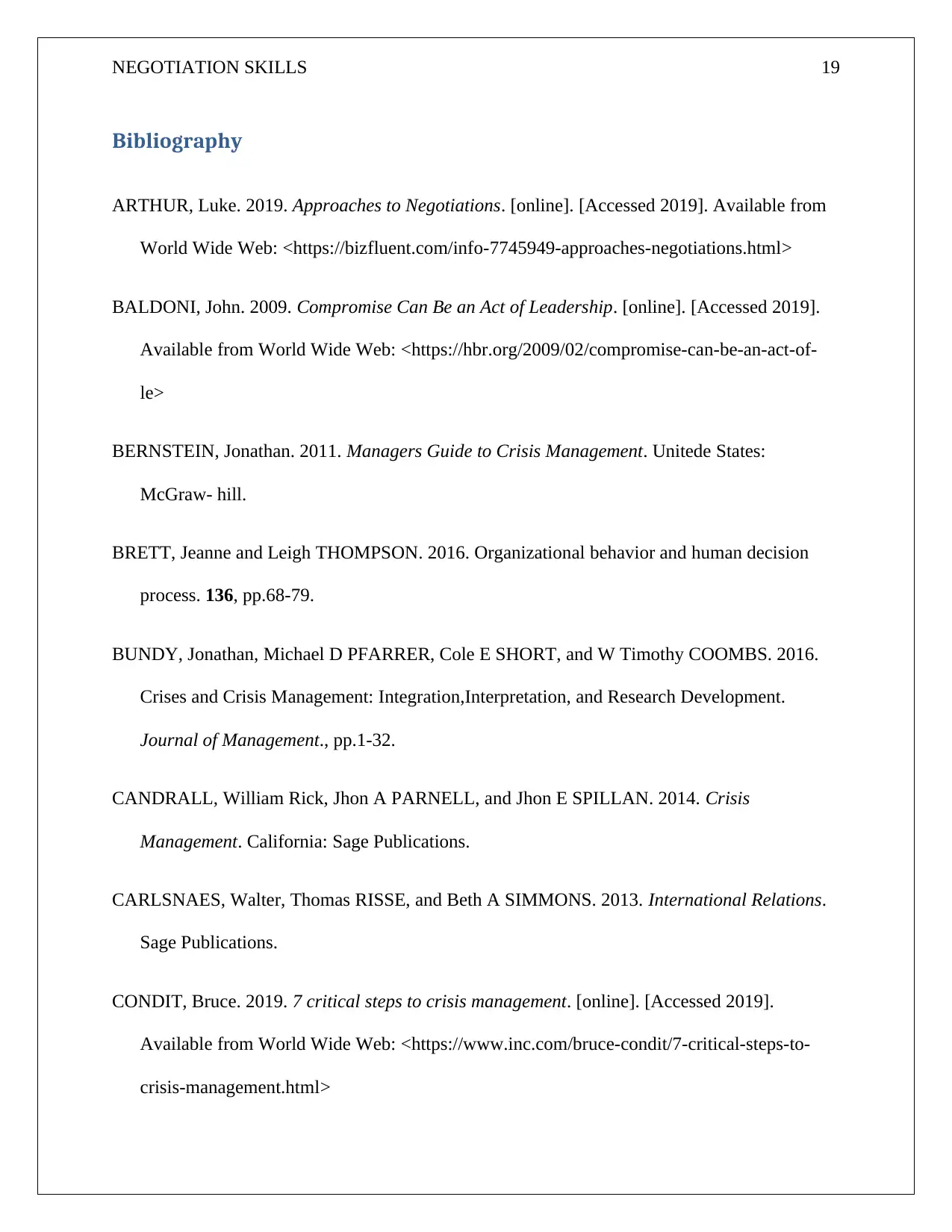
NEGOTIATION SKILLS 19
Bibliography
ARTHUR, Luke. 2019. Approaches to Negotiations. [online]. [Accessed 2019]. Available from
World Wide Web: <https://bizfluent.com/info-7745949-approaches-negotiations.html>
BALDONI, John. 2009. Compromise Can Be an Act of Leadership. [online]. [Accessed 2019].
Available from World Wide Web: <https://hbr.org/2009/02/compromise-can-be-an-act-of-
le>
BERNSTEIN, Jonathan. 2011. Managers Guide to Crisis Management. Unitede States:
McGraw- hill.
BRETT, Jeanne and Leigh THOMPSON. 2016. Organizational behavior and human decision
process. 136, pp.68-79.
BUNDY, Jonathan, Michael D PFARRER, Cole E SHORT, and W Timothy COOMBS. 2016.
Crises and Crisis Management: Integration,Interpretation, and Research Development.
Journal of Management., pp.1-32.
CANDRALL, William Rick, Jhon A PARNELL, and Jhon E SPILLAN. 2014. Crisis
Management. California: Sage Publications.
CARLSNAES, Walter, Thomas RISSE, and Beth A SIMMONS. 2013. International Relations.
Sage Publications.
CONDIT, Bruce. 2019. 7 critical steps to crisis management. [online]. [Accessed 2019].
Available from World Wide Web: <https://www.inc.com/bruce-condit/7-critical-steps-to-
crisis-management.html>
Bibliography
ARTHUR, Luke. 2019. Approaches to Negotiations. [online]. [Accessed 2019]. Available from
World Wide Web: <https://bizfluent.com/info-7745949-approaches-negotiations.html>
BALDONI, John. 2009. Compromise Can Be an Act of Leadership. [online]. [Accessed 2019].
Available from World Wide Web: <https://hbr.org/2009/02/compromise-can-be-an-act-of-
le>
BERNSTEIN, Jonathan. 2011. Managers Guide to Crisis Management. Unitede States:
McGraw- hill.
BRETT, Jeanne and Leigh THOMPSON. 2016. Organizational behavior and human decision
process. 136, pp.68-79.
BUNDY, Jonathan, Michael D PFARRER, Cole E SHORT, and W Timothy COOMBS. 2016.
Crises and Crisis Management: Integration,Interpretation, and Research Development.
Journal of Management., pp.1-32.
CANDRALL, William Rick, Jhon A PARNELL, and Jhon E SPILLAN. 2014. Crisis
Management. California: Sage Publications.
CARLSNAES, Walter, Thomas RISSE, and Beth A SIMMONS. 2013. International Relations.
Sage Publications.
CONDIT, Bruce. 2019. 7 critical steps to crisis management. [online]. [Accessed 2019].
Available from World Wide Web: <https://www.inc.com/bruce-condit/7-critical-steps-to-
crisis-management.html>
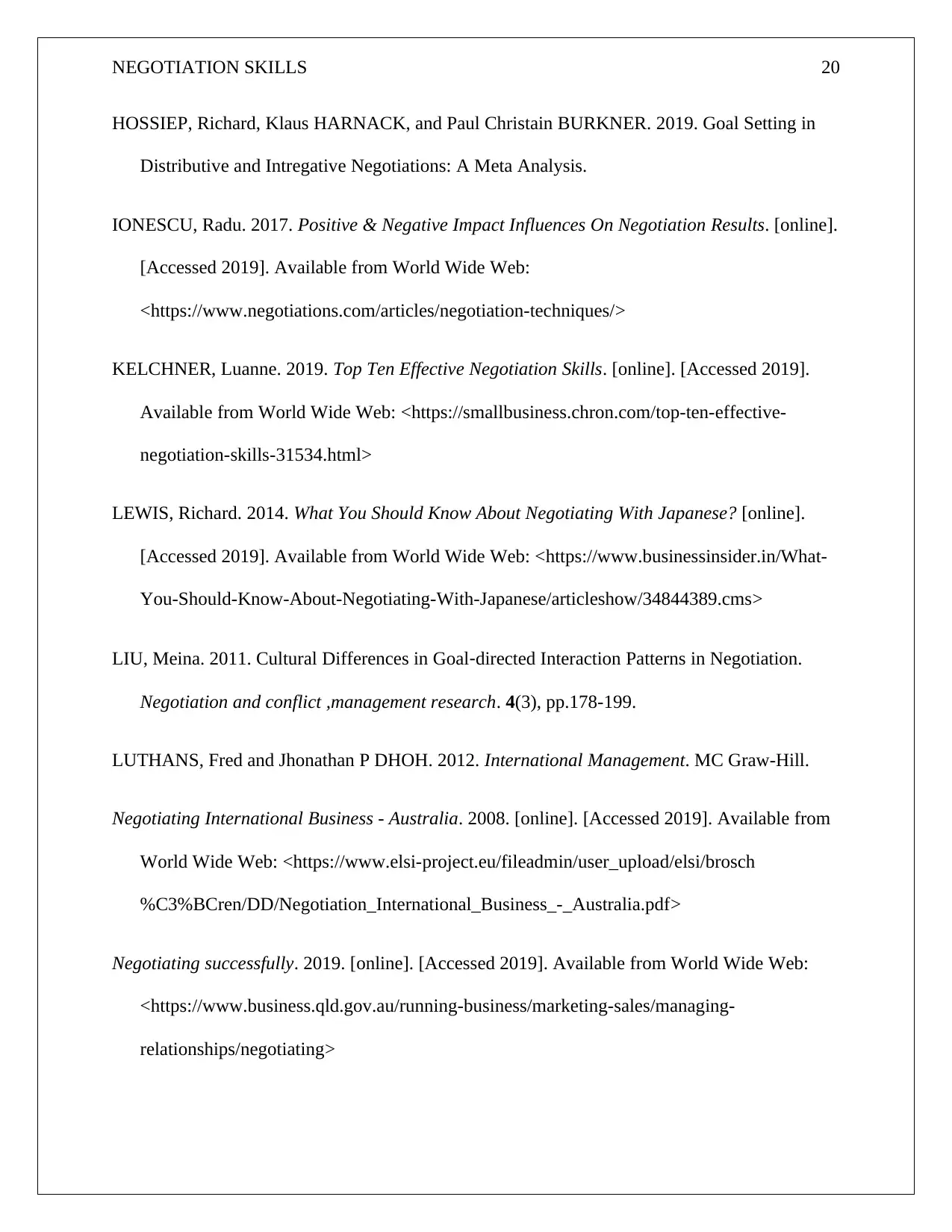
NEGOTIATION SKILLS 20
HOSSIEP, Richard, Klaus HARNACK, and Paul Christain BURKNER. 2019. Goal Setting in
Distributive and Intregative Negotiations: A Meta Analysis.
IONESCU, Radu. 2017. Positive & Negative Impact Influences On Negotiation Results. [online].
[Accessed 2019]. Available from World Wide Web:
<https://www.negotiations.com/articles/negotiation-techniques/>
KELCHNER, Luanne. 2019. Top Ten Effective Negotiation Skills. [online]. [Accessed 2019].
Available from World Wide Web: <https://smallbusiness.chron.com/top-ten-effective-
negotiation-skills-31534.html>
LEWIS, Richard. 2014. What You Should Know About Negotiating With Japanese? [online].
[Accessed 2019]. Available from World Wide Web: <https://www.businessinsider.in/What-
You-Should-Know-About-Negotiating-With-Japanese/articleshow/34844389.cms>
LIU, Meina. 2011. Cultural Differences in Goal‐directed Interaction Patterns in Negotiation.
Negotiation and conflict ,management research. 4(3), pp.178-199.
LUTHANS, Fred and Jhonathan P DHOH. 2012. International Management. MC Graw-Hill.
Negotiating International Business - Australia. 2008. [online]. [Accessed 2019]. Available from
World Wide Web: <https://www.elsi-project.eu/fileadmin/user_upload/elsi/brosch
%C3%BCren/DD/Negotiation_International_Business_-_Australia.pdf>
Negotiating successfully. 2019. [online]. [Accessed 2019]. Available from World Wide Web:
<https://www.business.qld.gov.au/running-business/marketing-sales/managing-
relationships/negotiating>
HOSSIEP, Richard, Klaus HARNACK, and Paul Christain BURKNER. 2019. Goal Setting in
Distributive and Intregative Negotiations: A Meta Analysis.
IONESCU, Radu. 2017. Positive & Negative Impact Influences On Negotiation Results. [online].
[Accessed 2019]. Available from World Wide Web:
<https://www.negotiations.com/articles/negotiation-techniques/>
KELCHNER, Luanne. 2019. Top Ten Effective Negotiation Skills. [online]. [Accessed 2019].
Available from World Wide Web: <https://smallbusiness.chron.com/top-ten-effective-
negotiation-skills-31534.html>
LEWIS, Richard. 2014. What You Should Know About Negotiating With Japanese? [online].
[Accessed 2019]. Available from World Wide Web: <https://www.businessinsider.in/What-
You-Should-Know-About-Negotiating-With-Japanese/articleshow/34844389.cms>
LIU, Meina. 2011. Cultural Differences in Goal‐directed Interaction Patterns in Negotiation.
Negotiation and conflict ,management research. 4(3), pp.178-199.
LUTHANS, Fred and Jhonathan P DHOH. 2012. International Management. MC Graw-Hill.
Negotiating International Business - Australia. 2008. [online]. [Accessed 2019]. Available from
World Wide Web: <https://www.elsi-project.eu/fileadmin/user_upload/elsi/brosch
%C3%BCren/DD/Negotiation_International_Business_-_Australia.pdf>
Negotiating successfully. 2019. [online]. [Accessed 2019]. Available from World Wide Web:
<https://www.business.qld.gov.au/running-business/marketing-sales/managing-
relationships/negotiating>
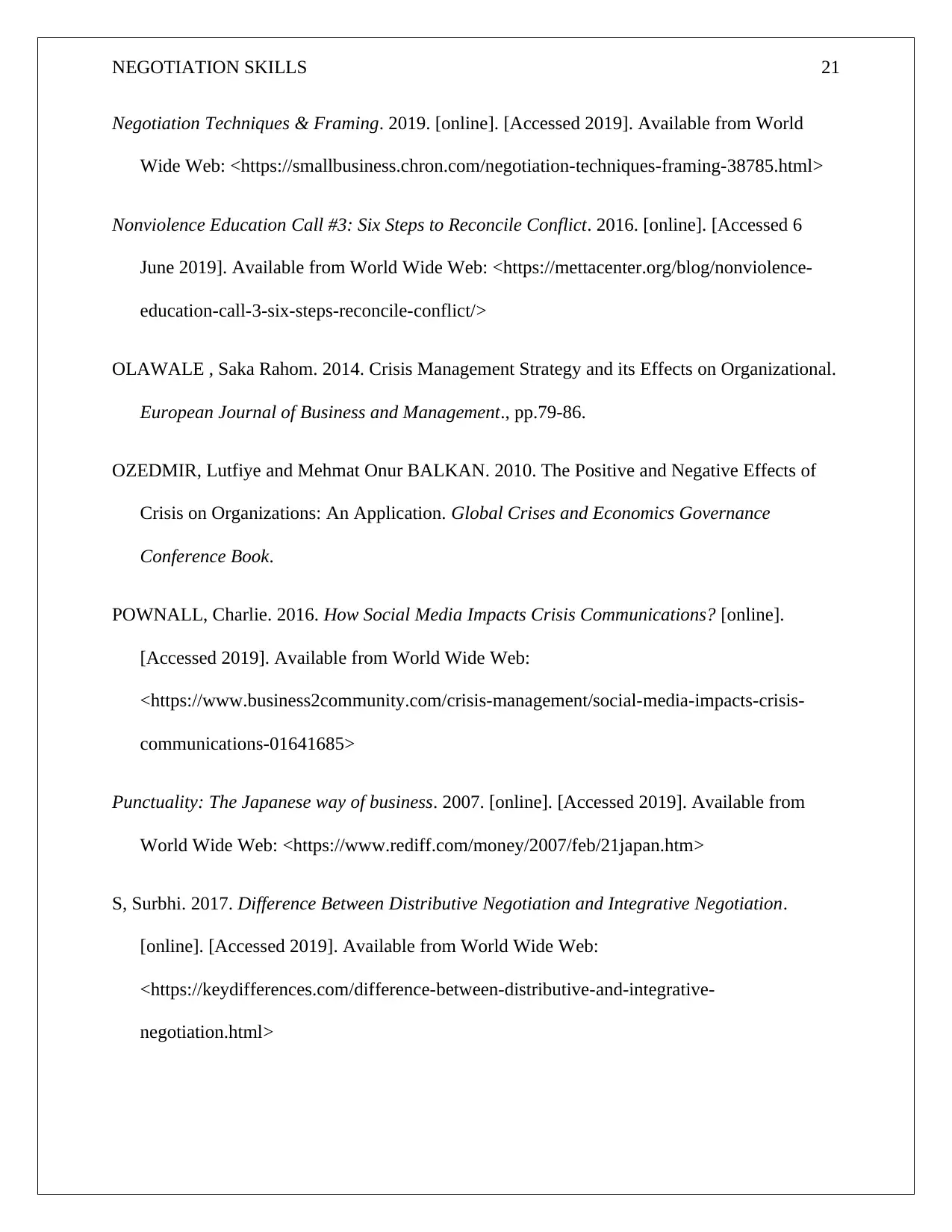
NEGOTIATION SKILLS 21
Negotiation Techniques & Framing. 2019. [online]. [Accessed 2019]. Available from World
Wide Web: <https://smallbusiness.chron.com/negotiation-techniques-framing-38785.html>
Nonviolence Education Call #3: Six Steps to Reconcile Conflict. 2016. [online]. [Accessed 6
June 2019]. Available from World Wide Web: <https://mettacenter.org/blog/nonviolence-
education-call-3-six-steps-reconcile-conflict/>
OLAWALE , Saka Rahom. 2014. Crisis Management Strategy and its Effects on Organizational.
European Journal of Business and Management., pp.79-86.
OZEDMIR, Lutfiye and Mehmat Onur BALKAN. 2010. The Positive and Negative Effects of
Crisis on Organizations: An Application. Global Crises and Economics Governance
Conference Book.
POWNALL, Charlie. 2016. How Social Media Impacts Crisis Communications? [online].
[Accessed 2019]. Available from World Wide Web:
<https://www.business2community.com/crisis-management/social-media-impacts-crisis-
communications-01641685>
Punctuality: The Japanese way of business. 2007. [online]. [Accessed 2019]. Available from
World Wide Web: <https://www.rediff.com/money/2007/feb/21japan.htm>
S, Surbhi. 2017. Difference Between Distributive Negotiation and Integrative Negotiation.
[online]. [Accessed 2019]. Available from World Wide Web:
<https://keydifferences.com/difference-between-distributive-and-integrative-
negotiation.html>
Negotiation Techniques & Framing. 2019. [online]. [Accessed 2019]. Available from World
Wide Web: <https://smallbusiness.chron.com/negotiation-techniques-framing-38785.html>
Nonviolence Education Call #3: Six Steps to Reconcile Conflict. 2016. [online]. [Accessed 6
June 2019]. Available from World Wide Web: <https://mettacenter.org/blog/nonviolence-
education-call-3-six-steps-reconcile-conflict/>
OLAWALE , Saka Rahom. 2014. Crisis Management Strategy and its Effects on Organizational.
European Journal of Business and Management., pp.79-86.
OZEDMIR, Lutfiye and Mehmat Onur BALKAN. 2010. The Positive and Negative Effects of
Crisis on Organizations: An Application. Global Crises and Economics Governance
Conference Book.
POWNALL, Charlie. 2016. How Social Media Impacts Crisis Communications? [online].
[Accessed 2019]. Available from World Wide Web:
<https://www.business2community.com/crisis-management/social-media-impacts-crisis-
communications-01641685>
Punctuality: The Japanese way of business. 2007. [online]. [Accessed 2019]. Available from
World Wide Web: <https://www.rediff.com/money/2007/feb/21japan.htm>
S, Surbhi. 2017. Difference Between Distributive Negotiation and Integrative Negotiation.
[online]. [Accessed 2019]. Available from World Wide Web:
<https://keydifferences.com/difference-between-distributive-and-integrative-
negotiation.html>
Secure Best Marks with AI Grader
Need help grading? Try our AI Grader for instant feedback on your assignments.
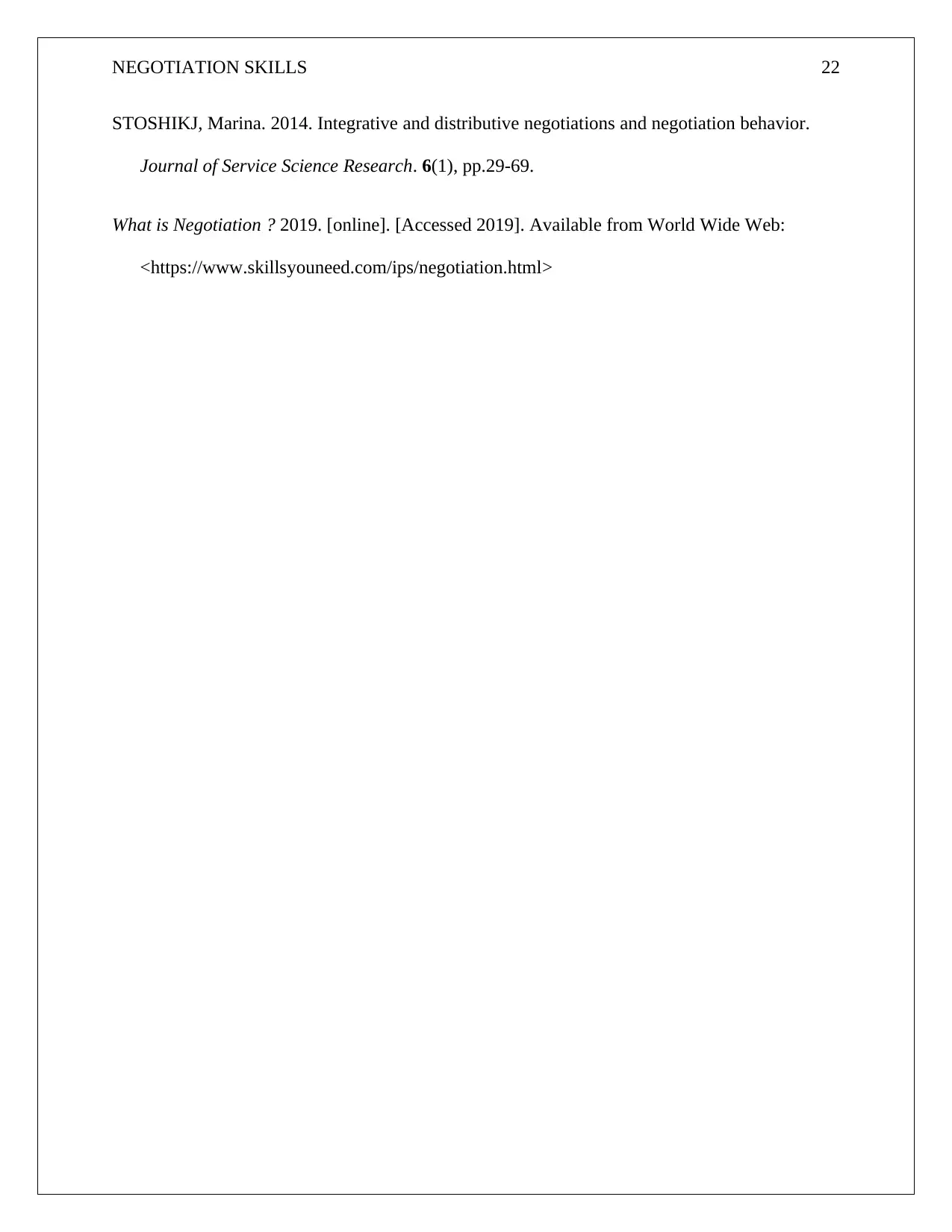
NEGOTIATION SKILLS 22
STOSHIKJ, Marina. 2014. Integrative and distributive negotiations and negotiation behavior.
Journal of Service Science Research. 6(1), pp.29-69.
What is Negotiation ? 2019. [online]. [Accessed 2019]. Available from World Wide Web:
<https://www.skillsyouneed.com/ips/negotiation.html>
STOSHIKJ, Marina. 2014. Integrative and distributive negotiations and negotiation behavior.
Journal of Service Science Research. 6(1), pp.29-69.
What is Negotiation ? 2019. [online]. [Accessed 2019]. Available from World Wide Web:
<https://www.skillsyouneed.com/ips/negotiation.html>
1 out of 23
Related Documents
Your All-in-One AI-Powered Toolkit for Academic Success.
+13062052269
info@desklib.com
Available 24*7 on WhatsApp / Email
![[object Object]](/_next/static/media/star-bottom.7253800d.svg)
Unlock your academic potential
© 2024 | Zucol Services PVT LTD | All rights reserved.




